Must-See for Matcha Lovers! Unique Feature on Top Matcha Sweets to Enjoy in Shizuoka, Japan’s Famous Tea Region
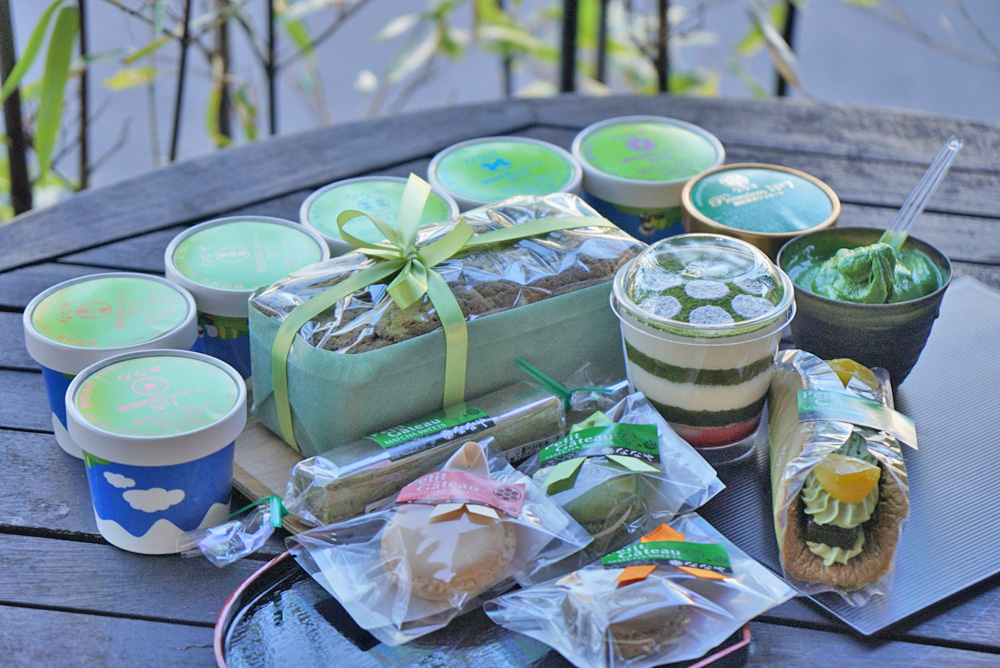
Shizuoka is widely known as a significant tea-producing region. Still, it is also where you can find some of the best matcha. Farmers cultivate Shizuoka matcha in a rich natural environment, and its moderate astringency, sweetness, and rich aroma continue to win over many tea connoisseurs and matcha fans. There are many different types of Shizuoka matcha. Asahina matcha, Kakegawa matcha, Motoyama matcha, Kawane matcha, Shimada matcha, and Mori matcha are all high-quality matcha with unique flavors.
In this article, we will introduce a host of the top shops for enjoying delectable Shizuoka matcha sweets, boasting a quality to rival Kyoto’s Uji matcha.
Contents
- 1 The Ultimate Matcha Sweets Experience in Shizuoka, Japan’s Famous Tea-Producing Region: Introduction to Carefully Selected Spots
- 1.1 Nanaya’s Matcha Gelato【Nanaya-Asahina Matcha-】
- 1.2 Matcha Tasting Parfait【Fujinokuni Tea Museum, Shizuoka -Asahina Matcha-】
- 1.3 Matcha Tiramisu【Marutamaen -Asahina Matcha-】
- 1.4 Gyokuro Affogato【Gyokuro no sato -Asahina Matcha-】
- 1.5 Matcha Jar Cake【CHA10 -Asahina Matcha/Kawane Matcha- 】
- 1.6 Organic Matcha Latte (Iced / Hot)— 4 Levels of Matcha Concentration! 【Organic Matcha Cafe NAGOMI -Kawane Matcha-】
- 1.7 Rich Green Tea Affogato【Chamachi KINZABURO -Honyama Matcha-】
- 1.8 Matcha Zenzai【Charaku -Honyama Matcha- 】
- 1.9 Matcha Chocolate Fondue(seasonal menu)【Chanome -Honyama Matcha-】
- 1.10 Matcha Soft Serve【Omatcha Kondou no Shokudou -Honyama Matcha/Yame Matcha-】
- 1.11 OMACHI Set【T’s green omachi -Shimada Matcha-】
- 1.12 A Harmonious Blend: Matcha, Coffee, and Cream Cheese【NO’AGE concentré -Shimada Matcha-】
- 1.13 Kakegawa Matcha Parfait【Nihoncha Kimikura -Kakegawa Matcha-】
- 1.14 Kudzu Dorayaki【Cha no Niwa -Kakegawa Matcha-】
- 1.15 Nonozukushi【Osadaen -Mori no Matcha-】
- 1.16 Tsuyuhikari Parfait【Maruyo Chaya -Uji Matcha- 】
- 1.17 Tea Affogato【MARUZEN Tea Roastery -Shizuoka Matcha-】
- 1.18 Must-See for Matcha Lovers! Unique Feature on Top Matcha Sweets to Enjoy in Shizuoka, Japan’s Famous Tea Region – summary –
The Ultimate Matcha Sweets Experience in Shizuoka, Japan’s Famous Tea-Producing Region: Introduction to Carefully Selected Spots
Many cafes and specialty stores in Shizuoka Prefecture offer delightful matcha sweets fusing ancient tradition and modern innovation. Here, we guide you to a selection of the best spots to enjoy the rich flavors unique to Shizuoka, including parfaits, cakes, ice cream, and Japanese and Western sweets crafted to bring out the full flavor of matcha. Whether you are a matcha lover or have yet to discover the charms of matcha, please try the blissful matcha sweets only found here in Shizuoka. Let’s get right to it and introduce our recommended matcha sweets.
Nanaya’s Matcha Gelato【Nanaya-Asahina Matcha-】
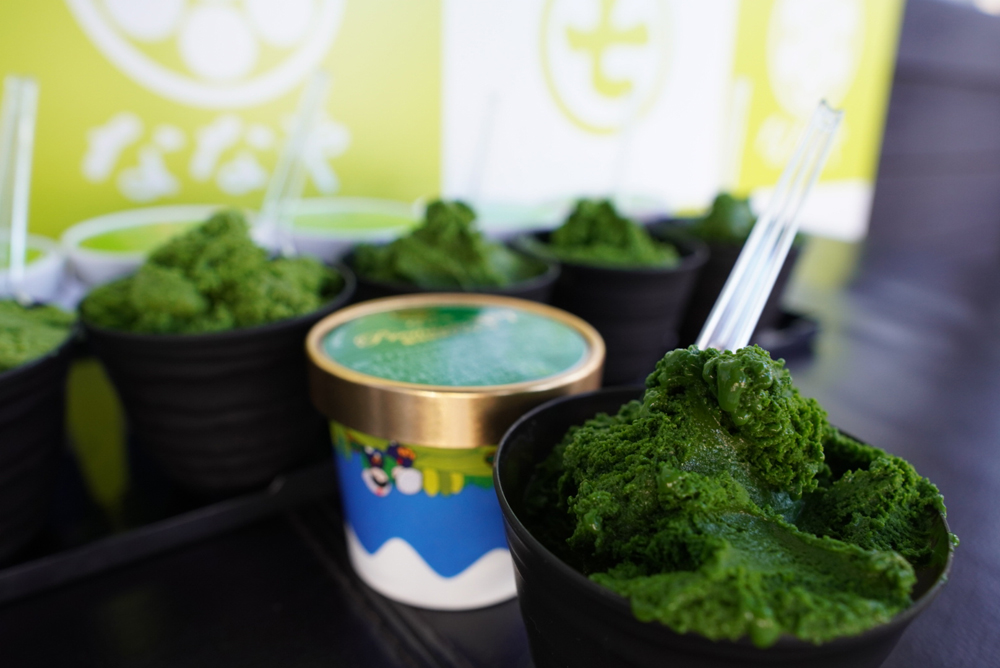
Nanaya, the specialty tea store run by Marushichi Seicha, has made matcha in the Asahina mountains in Fujieda since 1988. After many years of perfecting their product, they have developed profoundly high-quality Shizuoka matcha.
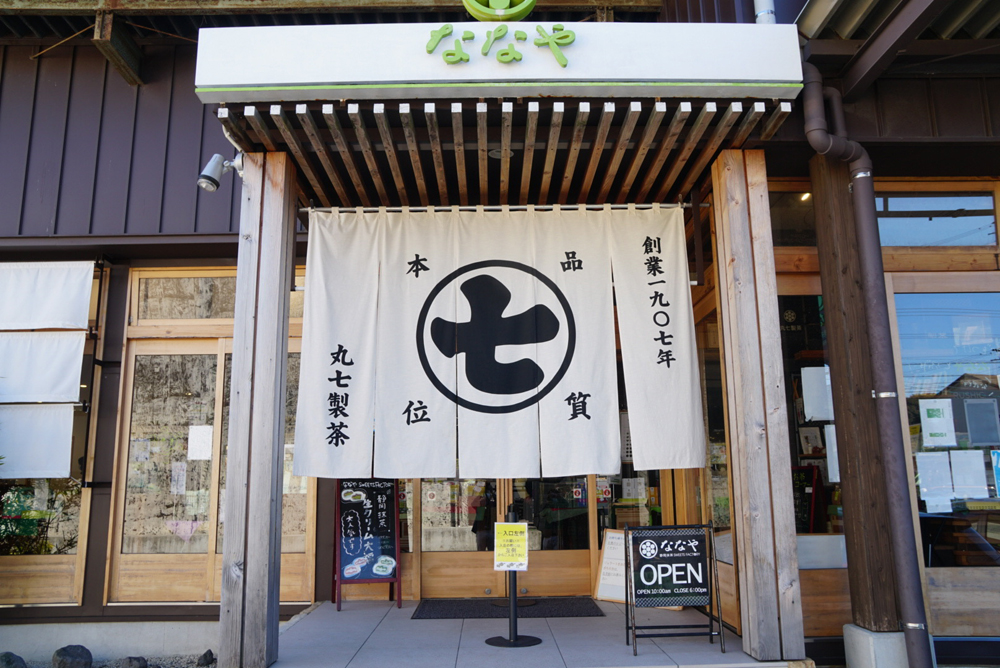 ▲Nanaya’s Flagship Store located in Fujieda City, Shizuoka Prefecture.
▲Nanaya’s Flagship Store located in Fujieda City, Shizuoka Prefecture.
The originality of this long-established shop’s matcha gelato is the seven different levels of matcha concentration available. From the light flavor of matcha level 1 to the surprisingly rich and deep matcha level 7, the wide range of flavors offers a unique taste experience, worlds apart from a typical matcha ice cream.
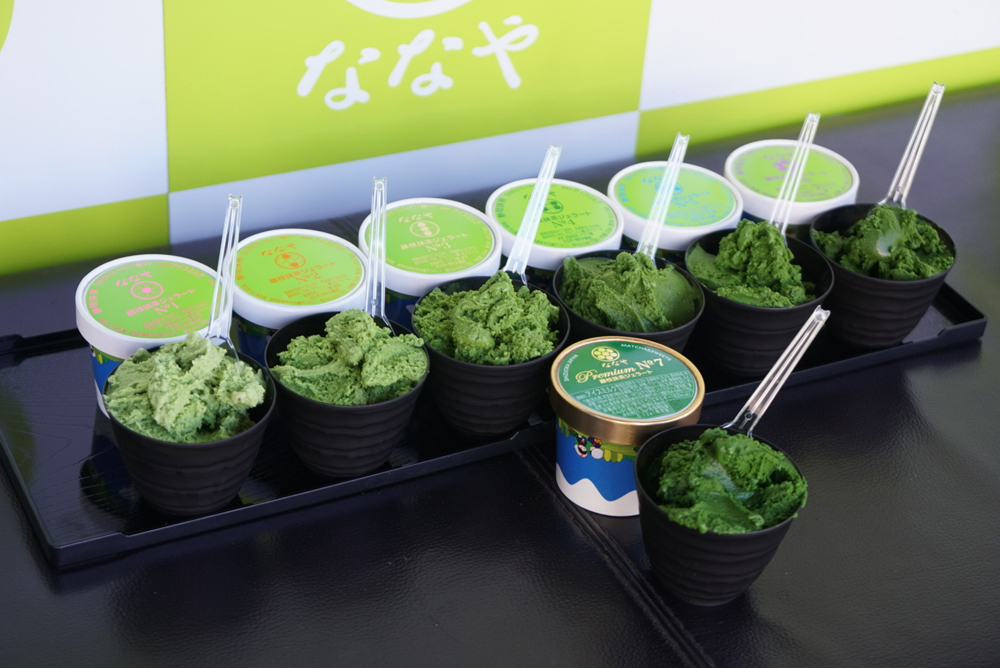
In particular, the matcha level 7 is aptly named the world’s richest matcha gelato. With just one mouthful, the rich aroma unfurls with the ideal balance of sweetness and bitterness, accentuating the taste of matcha to the utmost. The world’s richest matcha gelato— guaranteed to be an experience you won’t forget.
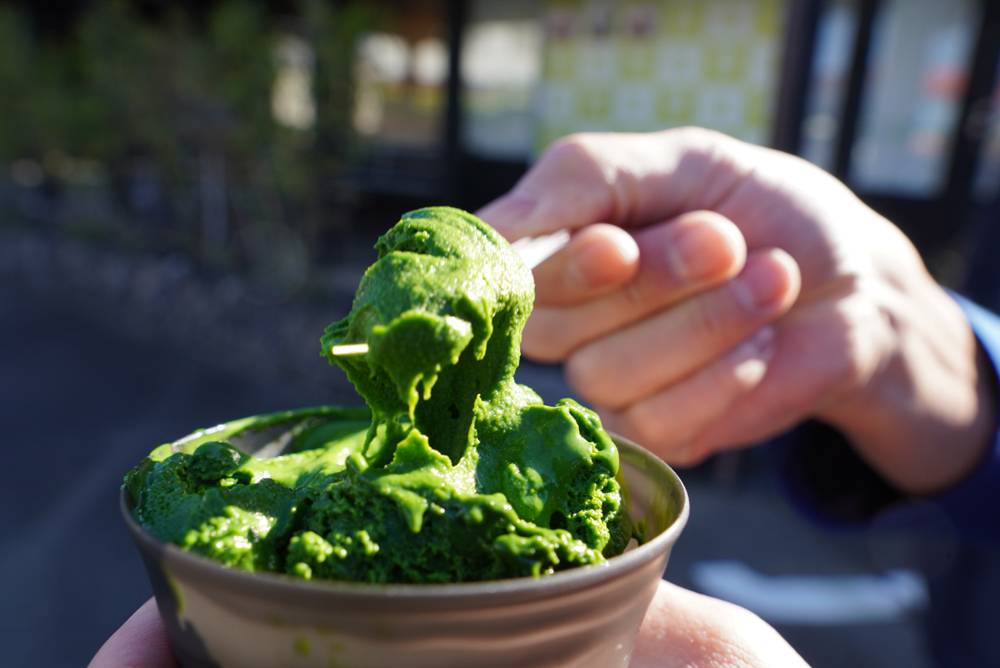
At Nanaya, there is always something new to discover. Alongside the matcha gelato, try popular cafe treats and other matcha-related products at this must-visit spot for matcha and tea lovers alike.
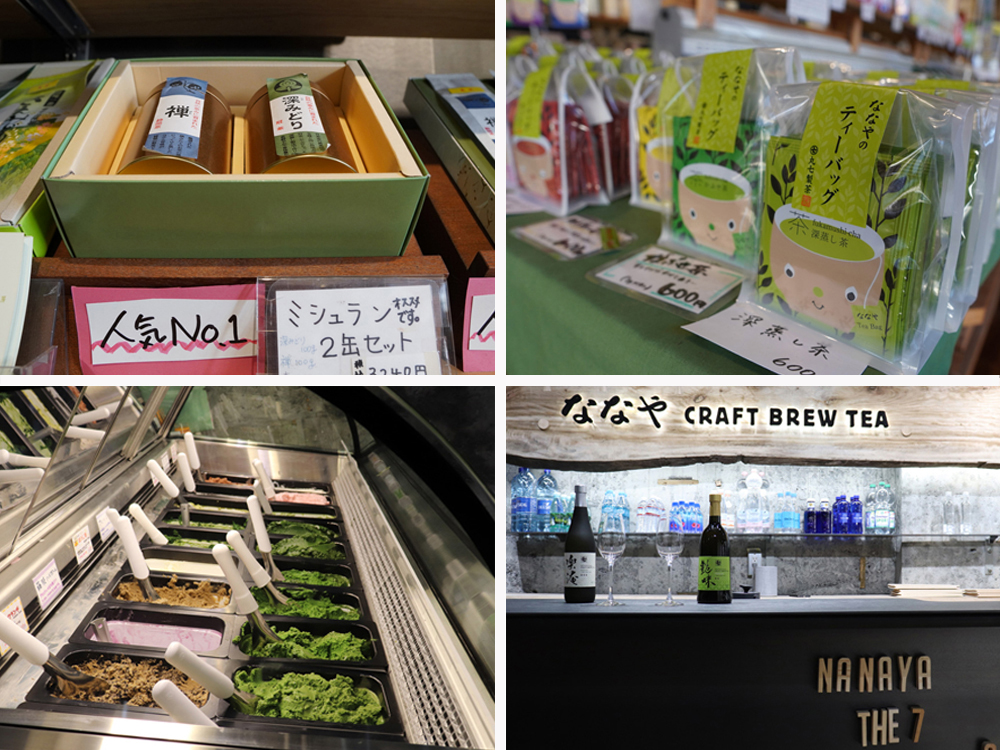
For more information about this shop, click here>
【Address】 141-1, Seto, Fujieda, Shizuoka, Japan
【Business hours】10:00 – 18:00
Closed on Wednesdays (open if Wednesday is a public holiday)
【Access】10 min drive from JR Fujieda Station.
【Parking】Available
【Web Site】https://nanaya-matcha.com/
Matcha Tasting Parfait【Fujinokuni Tea Museum, Shizuoka -Asahina Matcha-】

The Fujinokuni Tea Museum, Shizuoka is located in Makinohara, Shizuoka Prefecture. In addition to a medley of tea experiences, the museum has a Japanese garden, a cafe restaurant, a shop, and a permanent exhibition highlighting the history of the Japanese tea industry, with plenty of other content throughout the year.
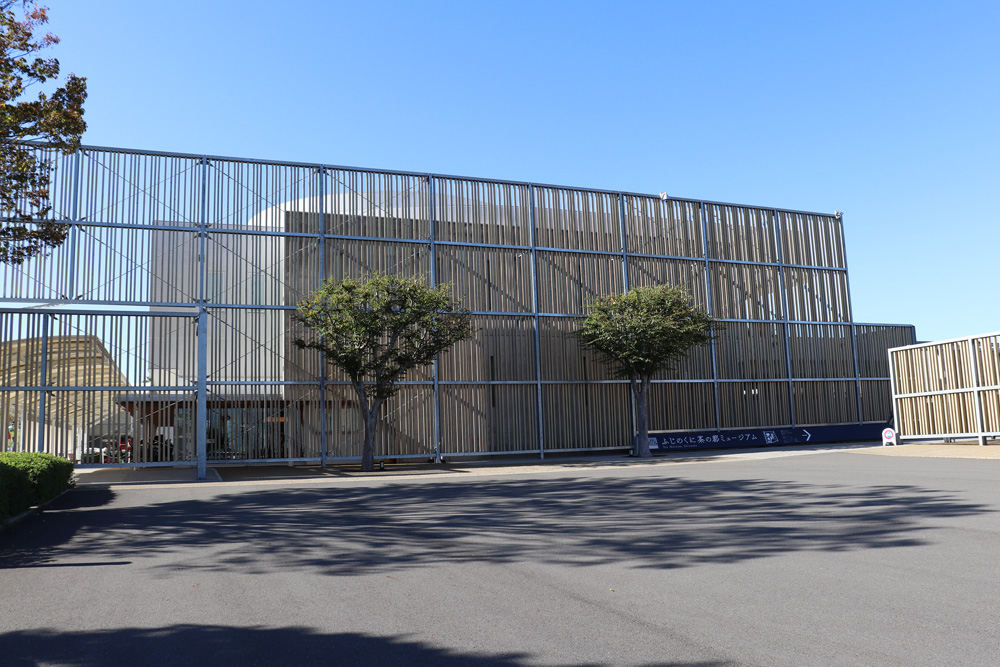
We recommend the Matcha Tasting Parfait. This parfait is made with three types of Nanaya’s matcha gelato: no. 7, the richest; no. 3, the standard; and no. 1, the subtlest; in addition to milk gelato, fresh cream, sponge, crunch, wafers, shiratama (sweet rice dumplings), azuki beans, and kuromitsu black sugar syrup. Full of discoveries, this dish is a must-try for matcha lovers.

Enjoy a luxurious time at the cafe restaurant Maruohara, enjoying tea sweets, tea-themed kaiseki cuisine, and a tasting event (last order at 13:00, closes at 14:00).
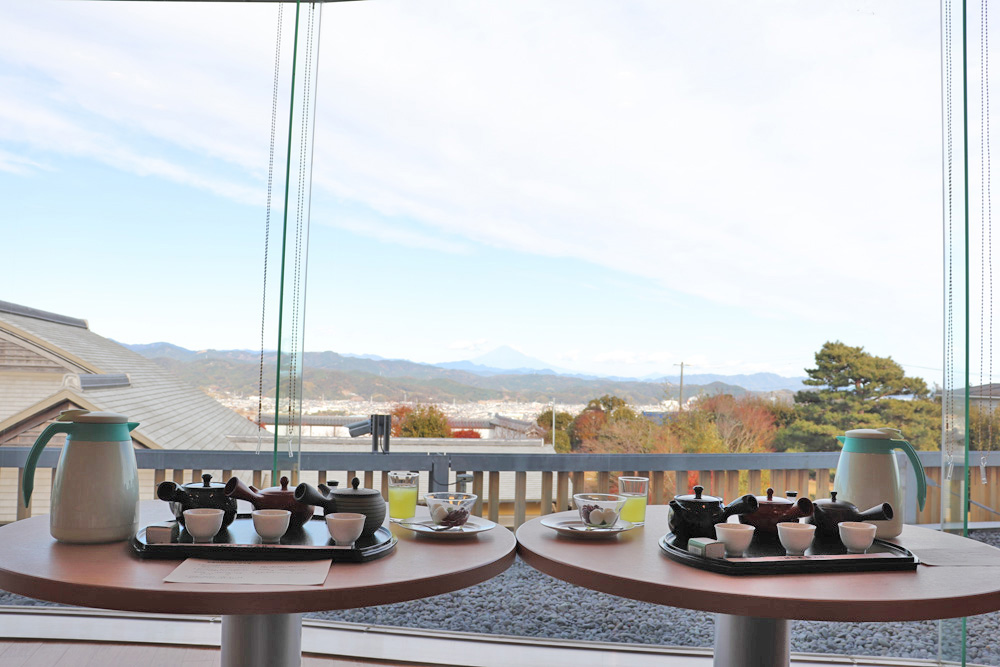
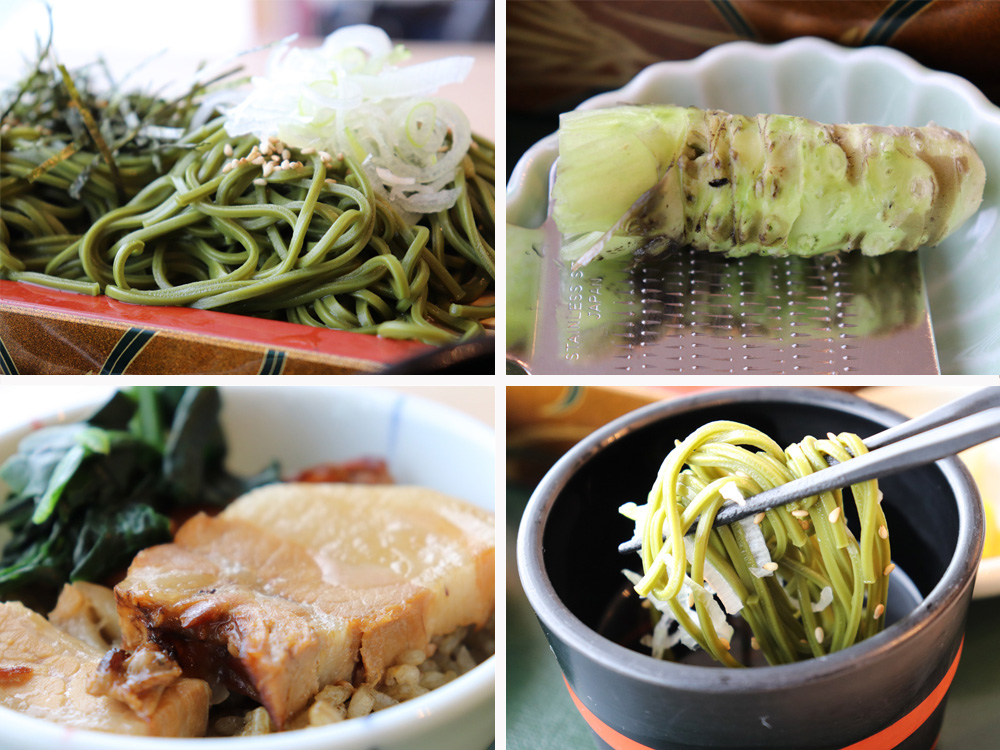
For more information about this shop, click here>>
【Address】 3053-2, Kanaya Fujimi-cho, Shimada-shi, Shizuoka-ken 428-0034
【Business hours】 9:00 to 17:00 (admission by 4.30pm).
Closed: Tuesdays (if Tuesday is a bank holiday, the museum is open on Tuesday and closed the following day), Year-end and New Year holidays.
【Web Site】https://tea-museum.jp/
【Access】10 minutes by car from the Sagara Makinohara IC on the Tomei Expressway.
【Parking】Availble
Matcha Tiramisu【Marutamaen -Asahina Matcha-】
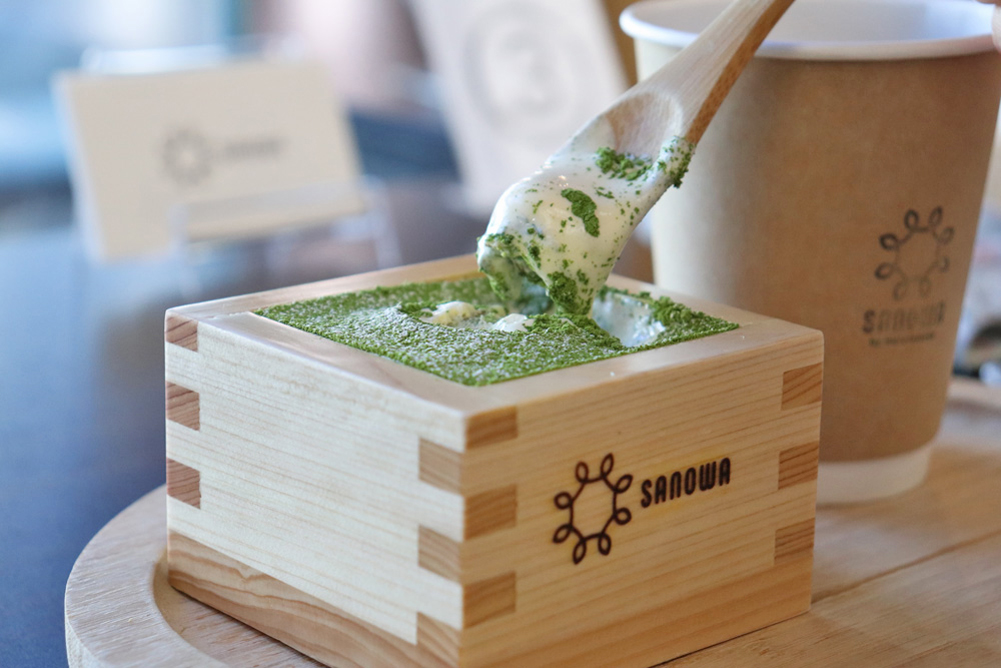
Marutamaen is a long-established tea wholesaler in Yaizu (known nationwide as a fishing town with the highest annual catch for seven consecutive years).
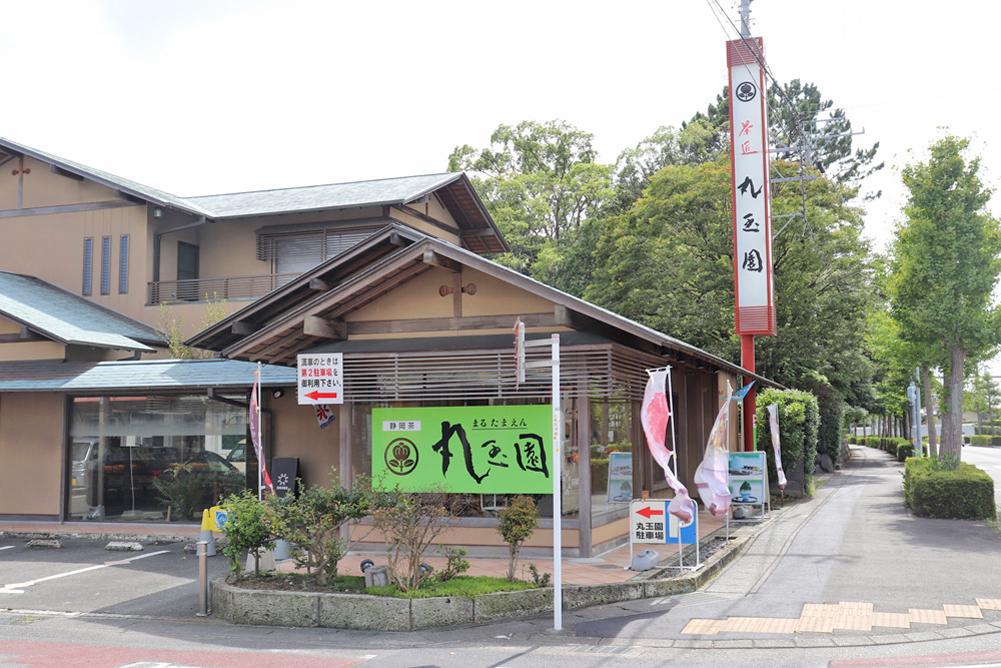
In 2018, Marutamaen launched a new brand dubbed SANOWA to extend the appeal of tea to younger generations. This brand aims to provide women a gift to heal their tired minds and bodies.
The cafe menu is particularly popular with younger customers. On weekends, there are often queues of customers visiting from outside the region.
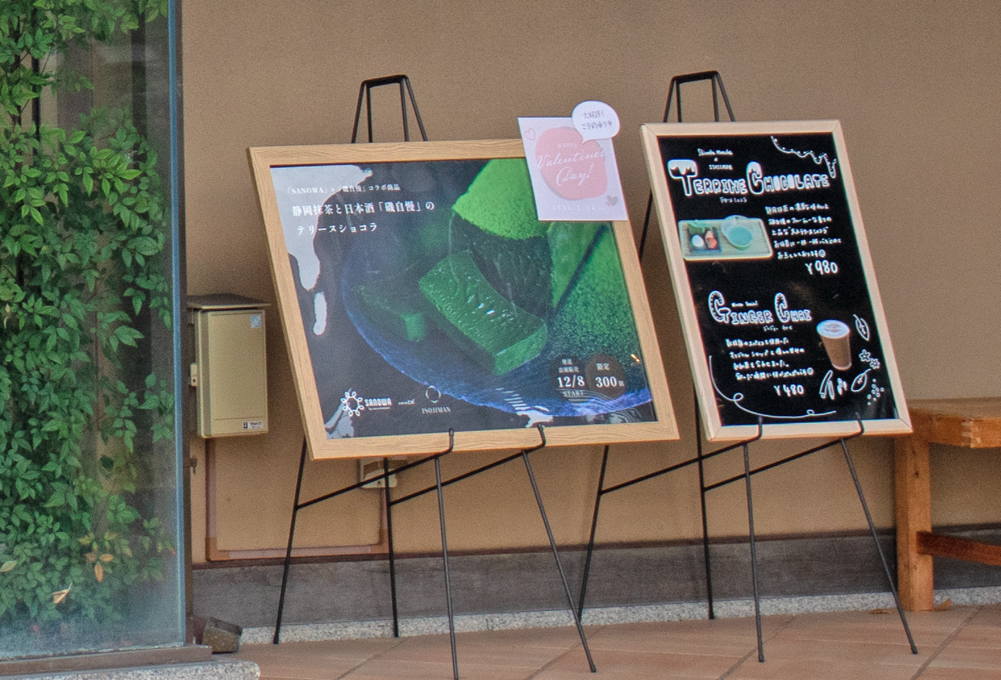
The most popular item on the menu is the Matcha Tiramisu, a masterpiece made with a perfect blend of high-quality matcha powder from Okabe in Shizuoka and mascarpone cheese, beautifully incorporating Japanese flavors into this traditional Italian dessert.
The deep flavor and bittersweet taste of matcha powder, sweetness of rich cream, and smooth texture combine perfectly in this heavenly concoction. Be sure to act fast, as it is often sold out on weekends and holidays.
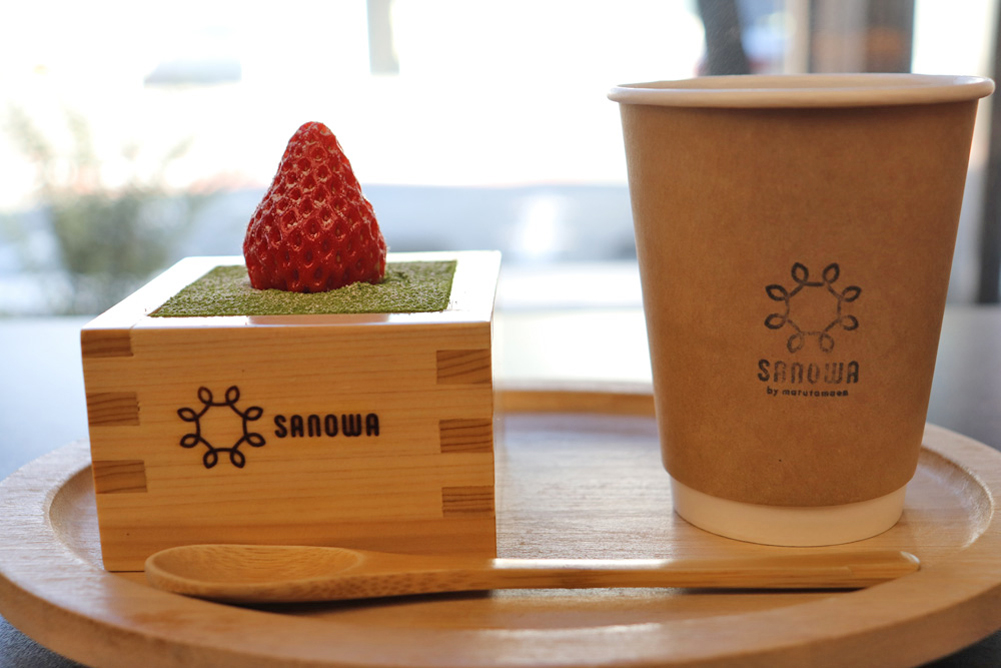 ▲Strawberry Matcha Tiramisu (with Japanese Tea)
▲Strawberry Matcha Tiramisu (with Japanese Tea)
If you visit Yaizu City, try the Matcha Tiramisu at the Marutamaen cafe. It will not disappoint.
For more information about this shop, click here>>
【Address】5-9-17 Higashi-Ogawa, Yaizu-shi, Shizuoka-ken 425-0035
【Business hours】9:30 – 18:00
Closed on Wednesdays (open in May, August and December)
【Web Site】https://sanowa-tea.jp/
【Access】15 min drive from Yaizu Station.
【Parking】Yes
Gyokuro Affogato【Gyokuro no sato -Asahina Matcha-】
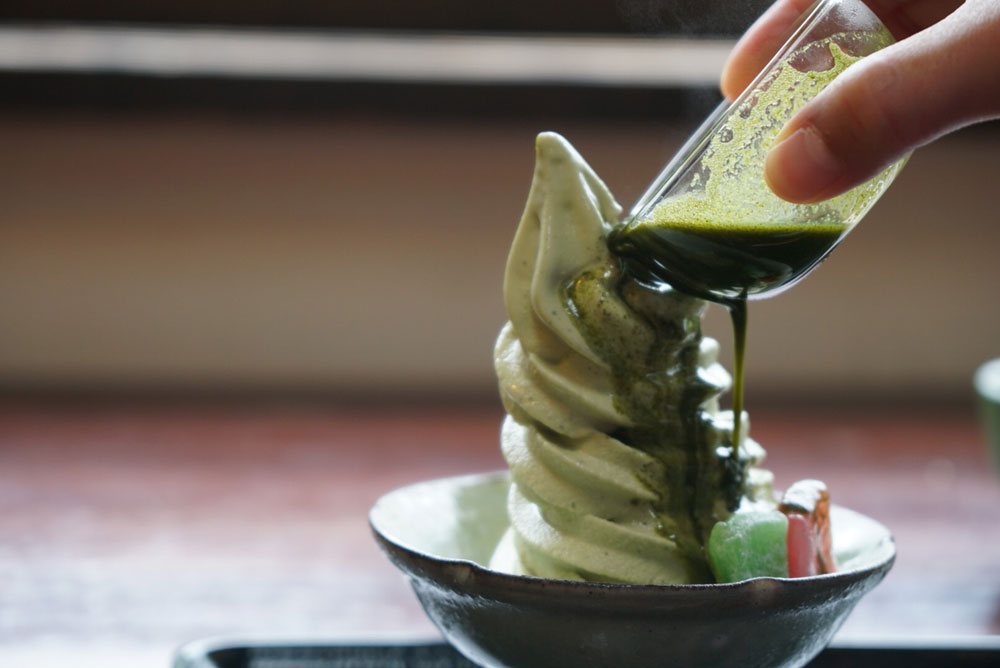
The Asahina area of Okabe in Shizuoka, a 10-minute drive from the Shintomei Fujieda Okabe IC, is a production area for high-quality gyokuro and matcha teas, rubbing shoulders with the likes of Kyoto’s Uji and Fukuoka’s Yame.
At the roadside station Gyokuro no Sato in the Asahina area, you can enjoy gyokuro and matcha tea while admiring the beautiful scenery of tea fields and mountains.
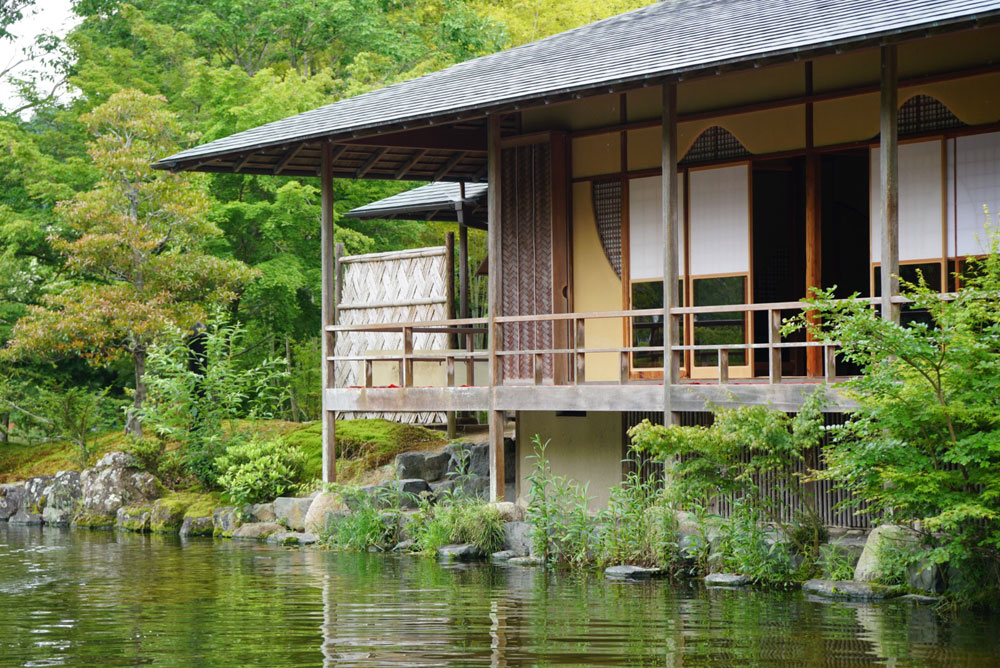
Enjoy the luxurious gyokuro affogato— refreshing green tea soft-serve ice cream topped with a rich green tea sauce— at the Cha no hanatei restaurant alongside other Japanese food and sweets made with local ingredients, such as green tea-flavored soba noodles.
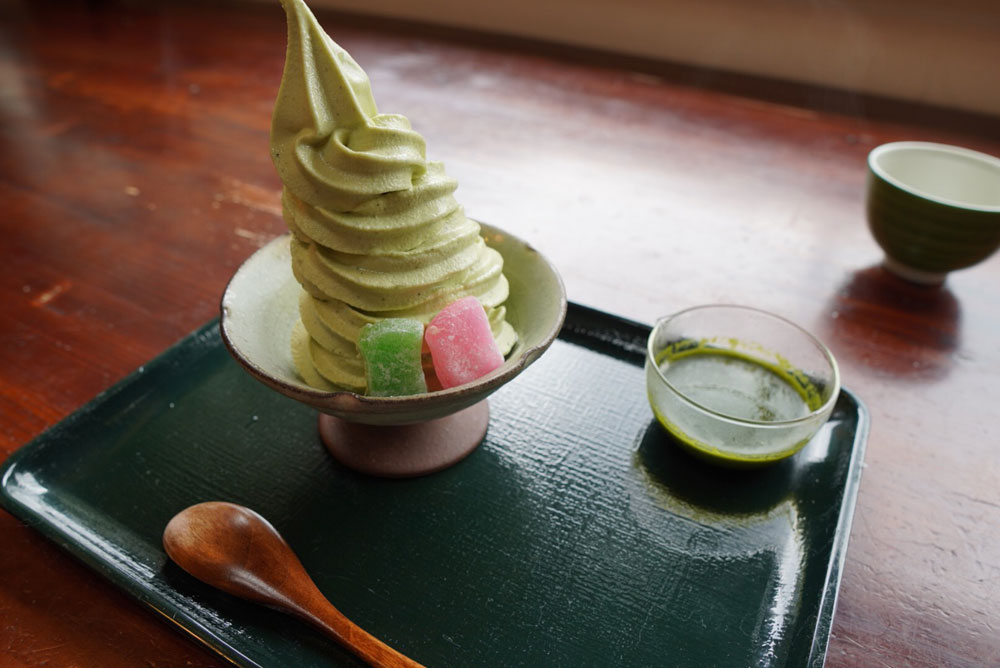
Cross over the Asahina River to relish high-quality gyokuro and matcha tea while admiring the beautiful Japanese garden at Hyogetsutei, a traditional Japanese tea ceremony room.
Indulge in a luxurious moment away from the city center, enclosed in a beautiful Japanese garden, accompanied by some rich matcha and creative Japanese sweets.
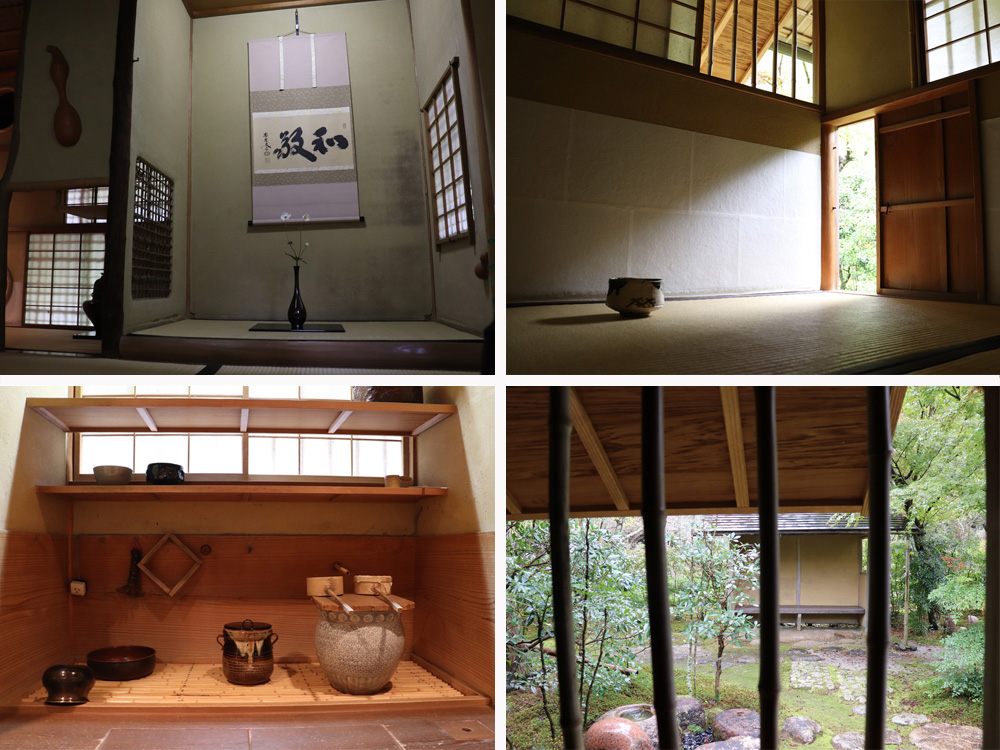
For more information about this shop, click here>>
【Address】1214-3 Shinfune, Okabe-cho, Fujieda-shi, Fujieda 421-1115
【Business hours】Chanokatei / Restaurant / 11:00-15:00 (last order 14:30)
Closed: Year-end and New Year holidays (28 Dec – 2 Jan)
【Web Site】https://www.shizutetsu-retailing.com/gyokuronosato/
【Access】20min drive from Tomei Yaizu IC.
【Parking】Availble
Matcha Jar Cake【CHA10 -Asahina Matcha/Kawane Matcha- 】
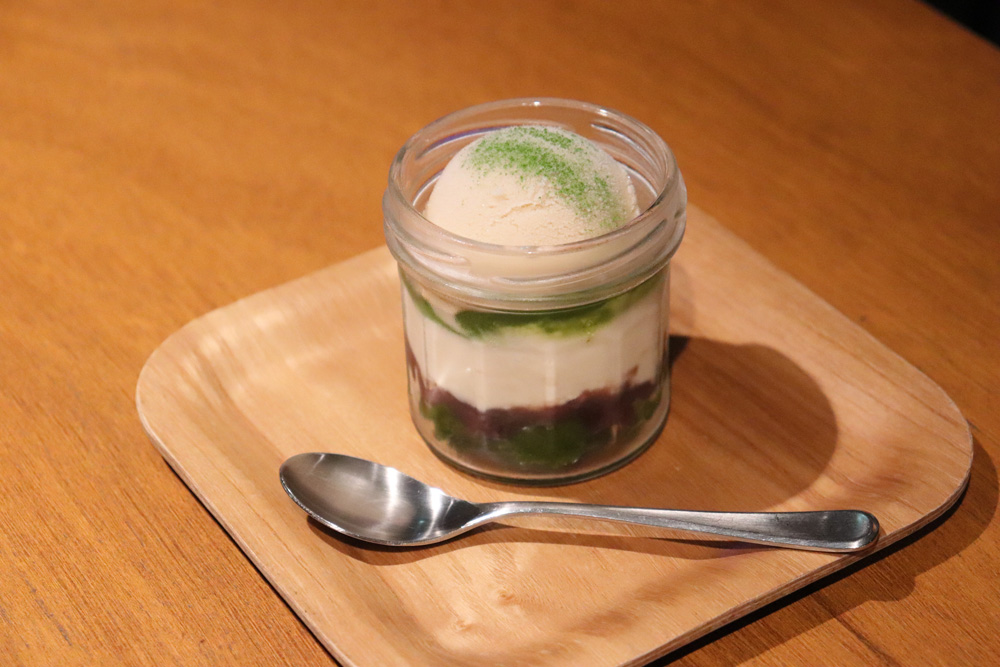
Kakuni Chato, headquartered in Shizuoka City, is a tea processing company that primarily handles organically grown tea and actively exports tea overseas. To make organic tea more accessible to the younger generation, Kakuni Chato opened the organic tea stand CHA10 in November 2017.
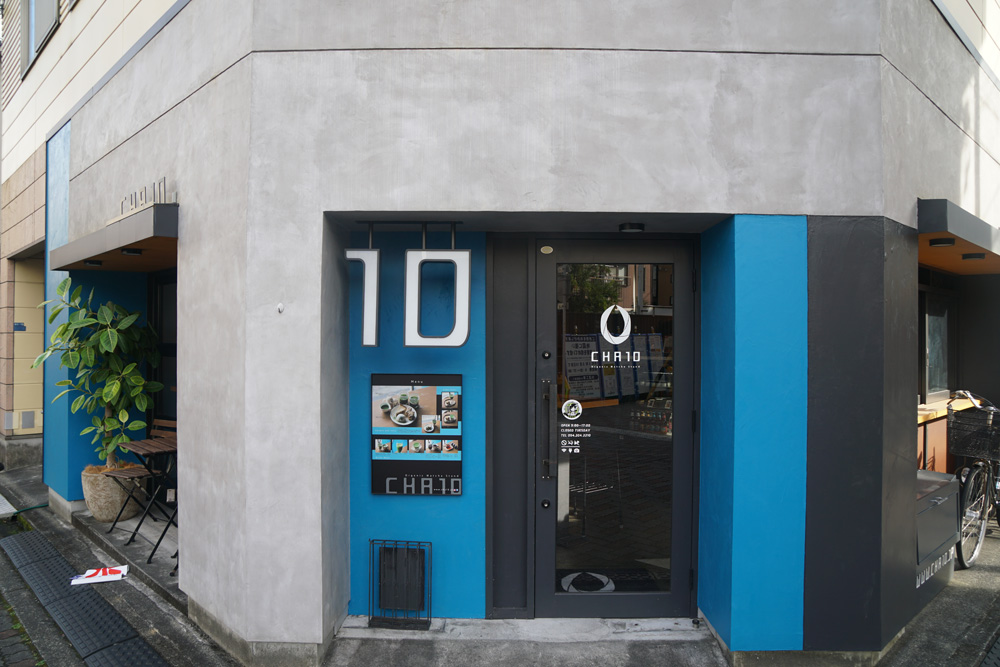
We recommend their flavorful yet mellow Matcha Jar Cake, made with matcha carefully selected by Kakuni Chato. Vivid green layers of matcha shining in the transparent jar in the relaxed cafe space stand out as a traditional tea-inspired sweet served in a fresh, beautiful style.
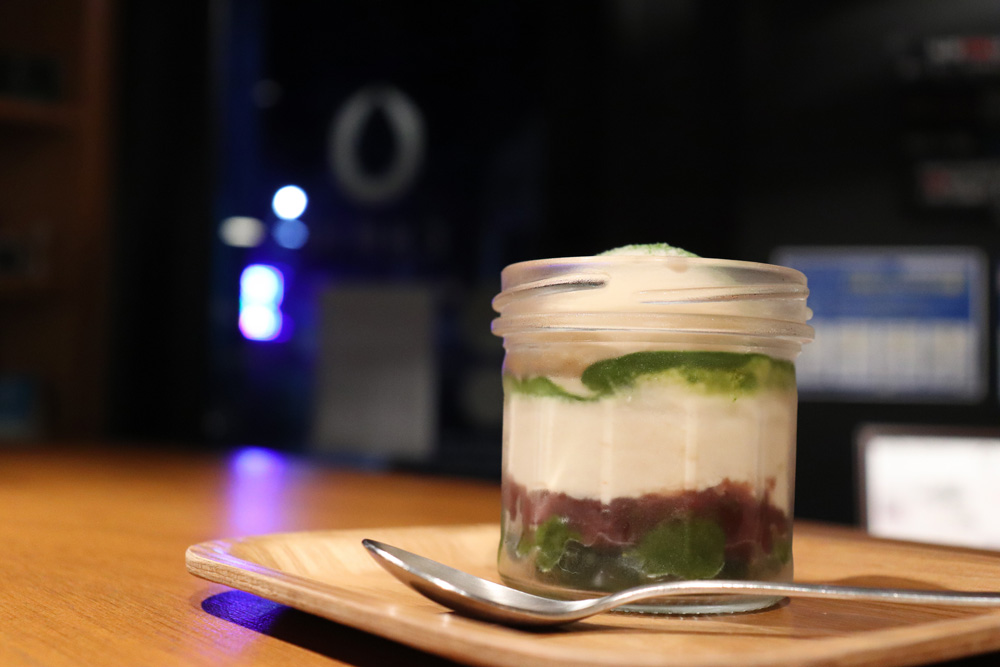
Layers of organic matcha pound cake, azuki beans boiled in sucrose, soy milk custard cream, and matcha sauce, each with its distinct flavor, cooperate harmoniously to create a perfectly satisfying whole.
The unquestionable quality of this long-established shop, fused with modern cafe culture, promises a special moment not to be missed.
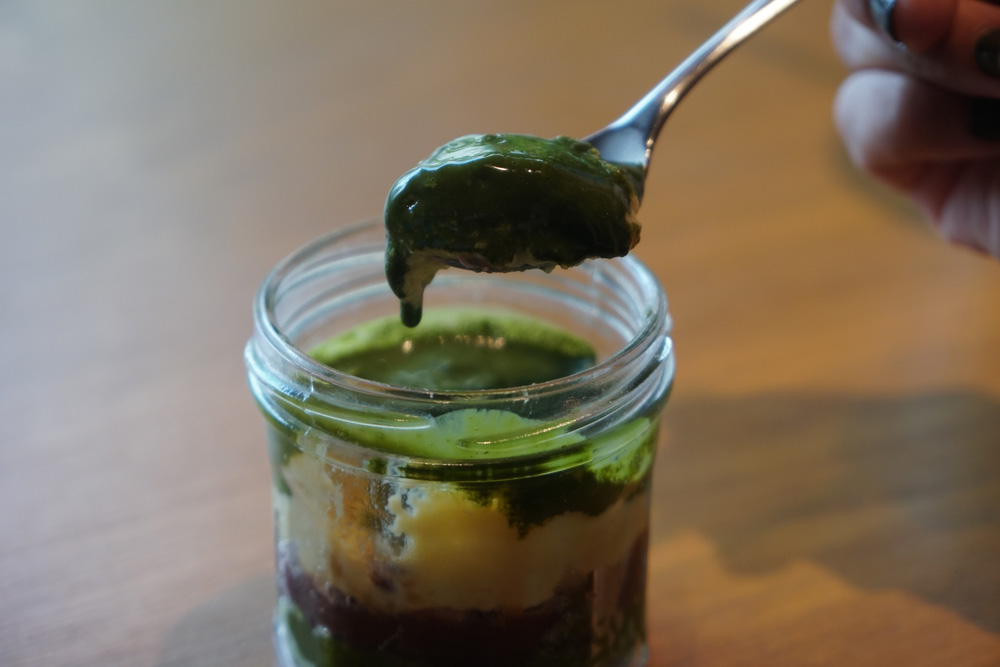
In addition, CHA10 also offers vegan sweets made from purely plant-based ingredients without eggs or dairy products. Enjoy delicious and healthy treats with menu items that pursue kindness to the body.
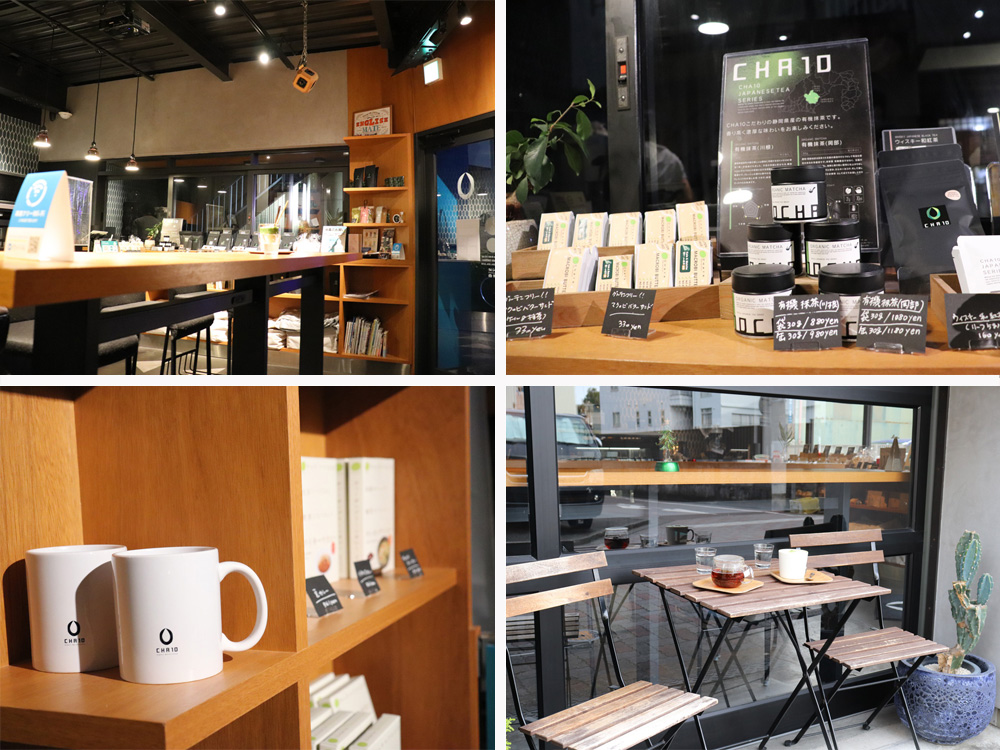
For more information about this shop, click here>>
【Address】 1-11-6 Takasho, Aoi-ku, Shizuoka City, 420-0839
【Business hours】9:00 – 17:00 (Eat-in until 18:30)
Closed on Tuesdays.
【Web Site】https://cha10.jp/index.html
【Access】5 min walk from Shin-Shizuoka Station.
【Parking】Not available (paid parking available nearby)
Organic Matcha Latte (Iced / Hot)— 4 Levels of Matcha Concentration! 【Organic Matcha Cafe NAGOMI -Kawane Matcha-】
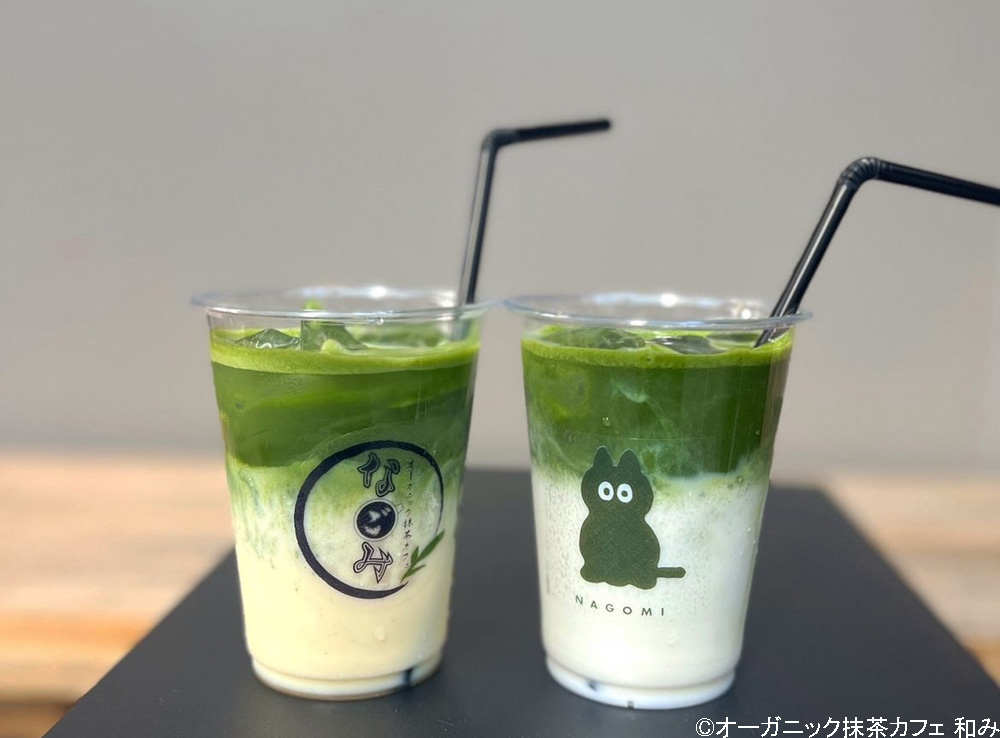
This café aims to bring the appeal of Shizuoka matcha to the world. Open from midday until late at night, it offers a diverse menu that features high-quality organic matcha sourced from Shizuoka.
One recommended item is the organic matcha latte, which allows you to choose from four levels. Enjoy the flavor of matcha tailored to your taste, ranging from the gentle sweetness of Hatsukoi to the rich depth of Zokkon.
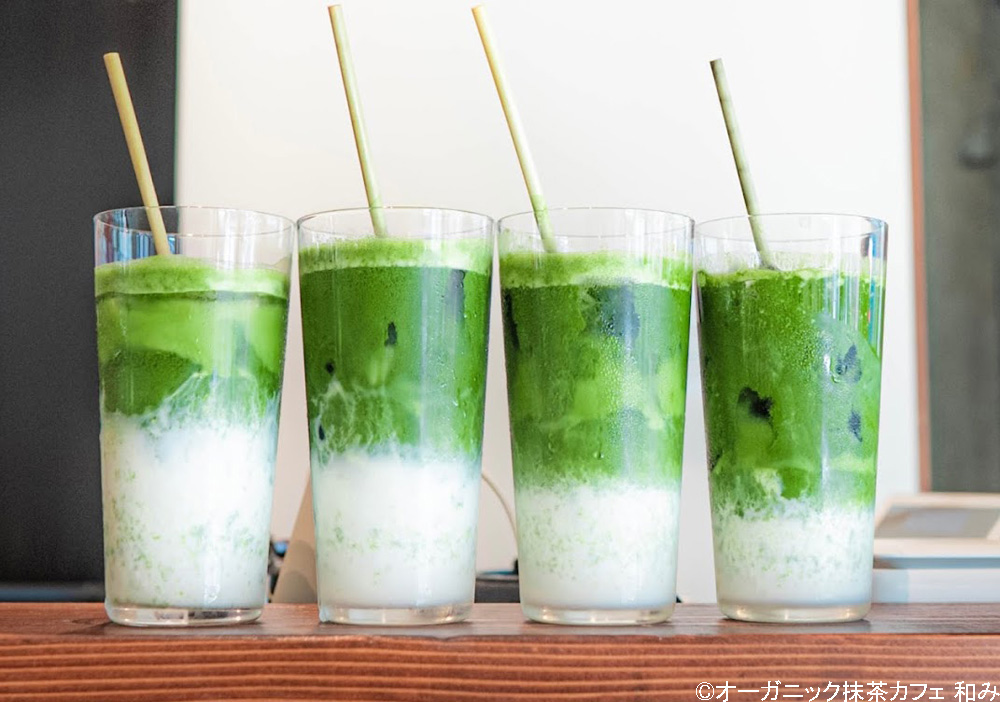
The Fuwamoco Matcha Latte, featuring fluffy milk foam, and the Affogato, which perfectly balances rich vanilla ice cream with matcha, are also popular menu choices. The Matcha Terrine also makes for a delightful souvenir, boasting a moist texture that is hard to resist.
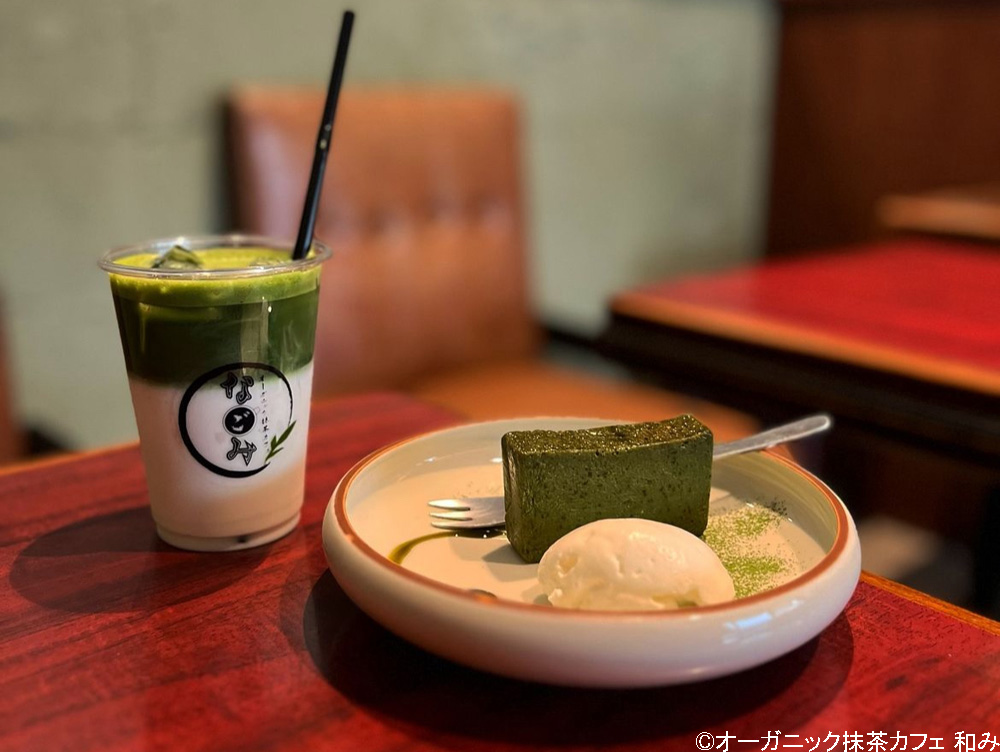
This café initially operated from a trailer and has since relocated six times in search of the perfect matcha café setup. Be sure to try the matcha sweets made by the owner, Mr. Yoshimura, infused with his passion and meticulous attention to detail.
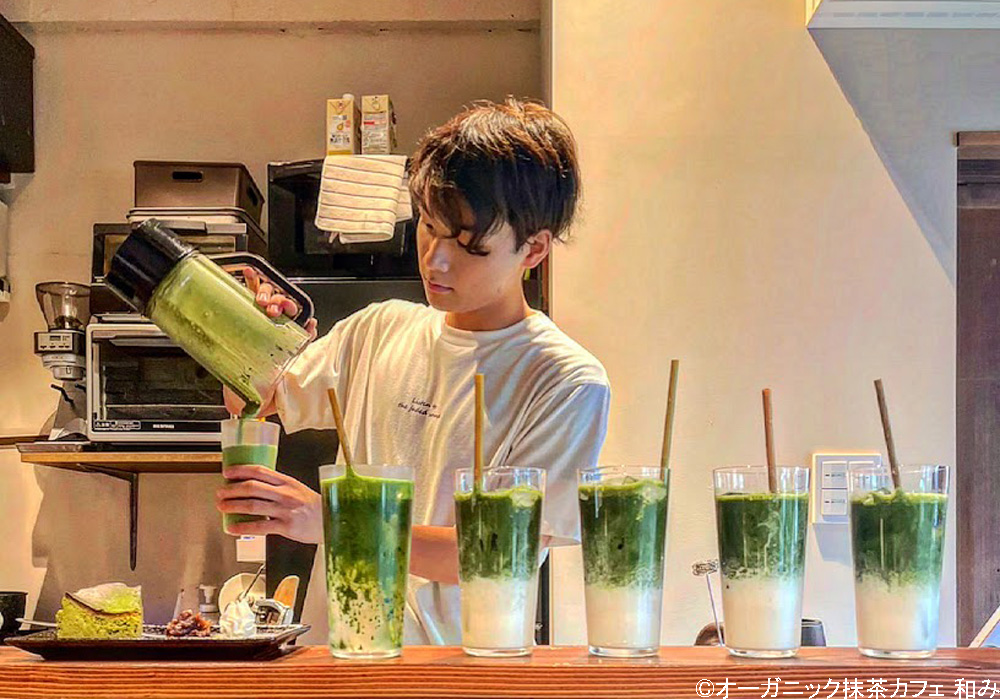
For more information about this shop, click here >>
【Address】10 Ikazuchi Yokocho, 14-6 Shichiken-cho, Aoi-ku, Shizuoka City, Shizuoka Prefecture, 420-0035, Japan
【Business hours】13:00~24:00(LO23:30) /No regular holidays
【Web Site】https://nagomi-matchacafe.com/
【Access】15 minutes walk from Shizuoka Station.
【Parking】Pay parking available nearby.
Rich Green Tea Affogato【Chamachi KINZABURO -Honyama Matcha-】
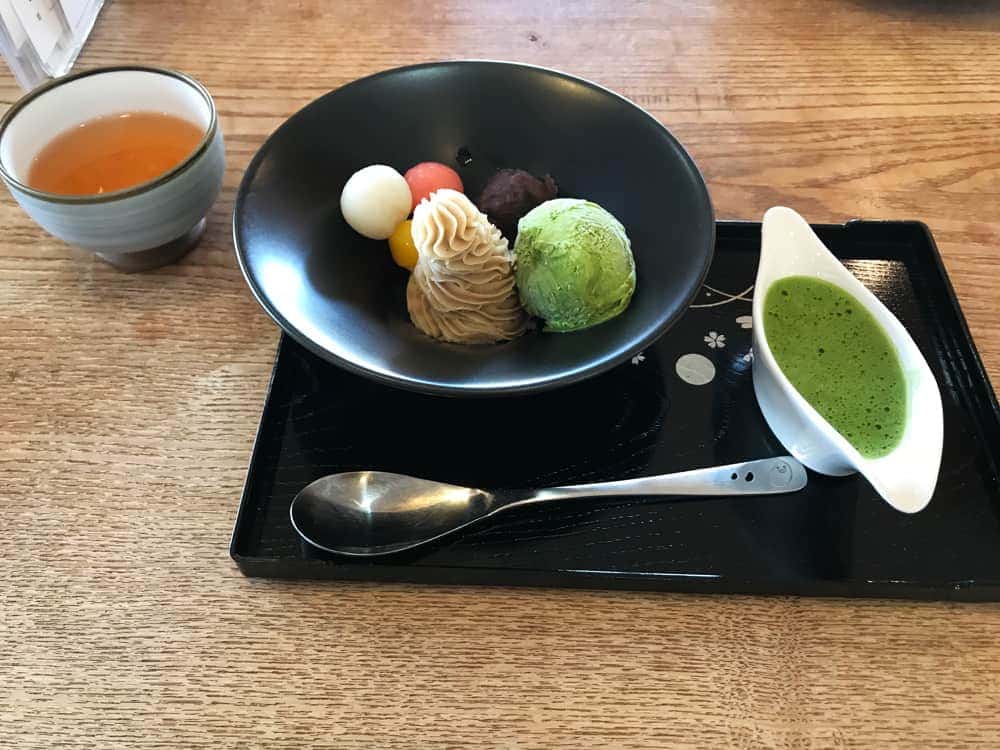
Chamachi KINZABURO is a Japanese tea café run by Maeda Kinsaburo Shoten, a tea wholesaler established in 1915. The owner, Mr. Maeda Toshio, won the 37th National Tea Judging Skills Competition 1990 and the Japanese Tea Instruction Competition.
His many achievements in the tea industry include appearances as the Ocha Tsuou (tea connoisseur) on TV Champion.
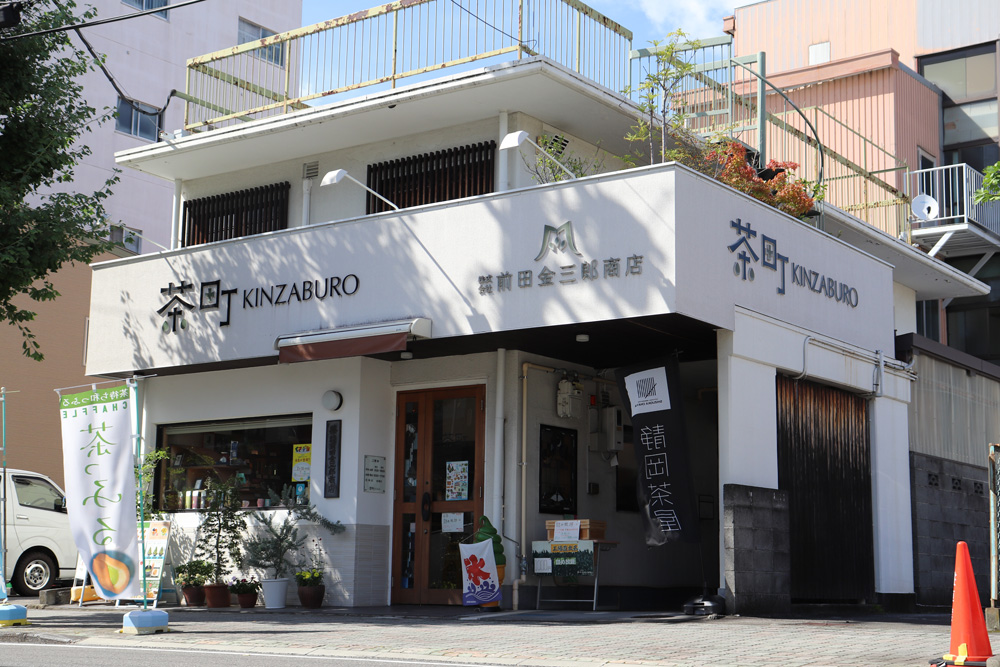
One of the standout matcha sweets is the O-noucha Affogato, which comes highly recommended due to the creator’s extensive knowledge and experience. This menu item is only available for dine-in, featuring a rich matcha sauce poured over cold matcha ice cream, chestnuts, anko (sweet red bean paste), and a unique Japanese-style Mont Blanc.
The appeal of this affogato goes beyond just the richness of the matcha. The bitterness and sweetness of the matcha are perfectly balanced, allowing the depth of flavor to unfold with each bite.
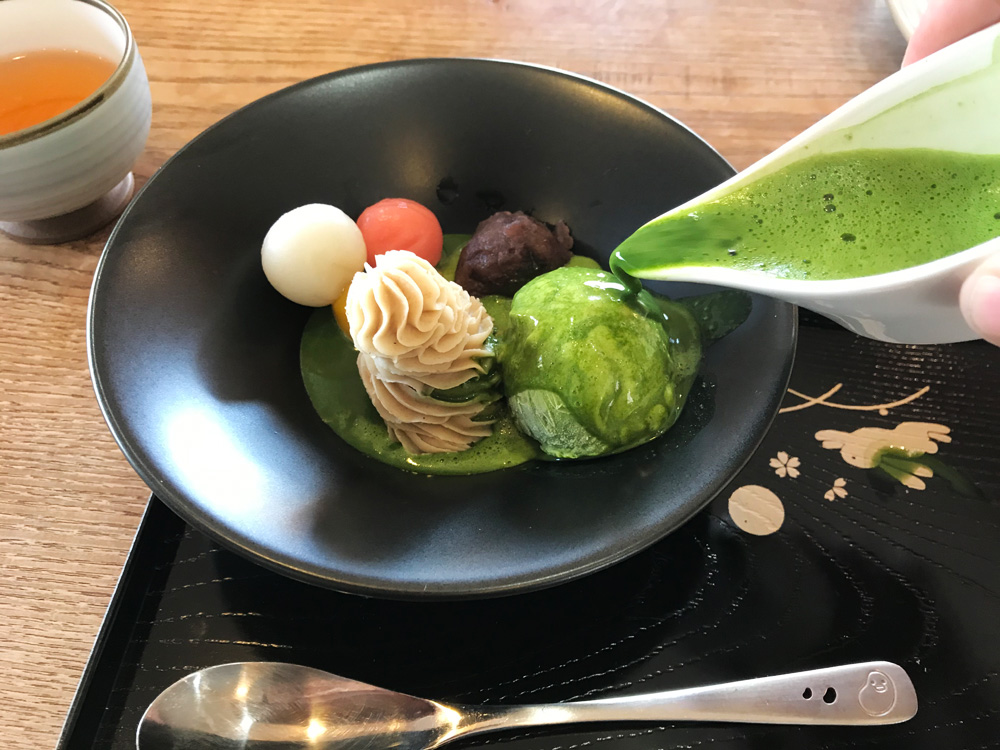
Additionally, the second floor features a dining area where you can sample over ten different tea flavors, all for free. Why not order a menu item from the café on the first floor, then head upstairs to find a tea that pairs perfectly with your sweets? Enjoy the delightful combination of flavors!
Experience a moment of luxury at Chamachi KINZABURO, a café that honors the traditions of Japan while blending them with contemporary café culture.
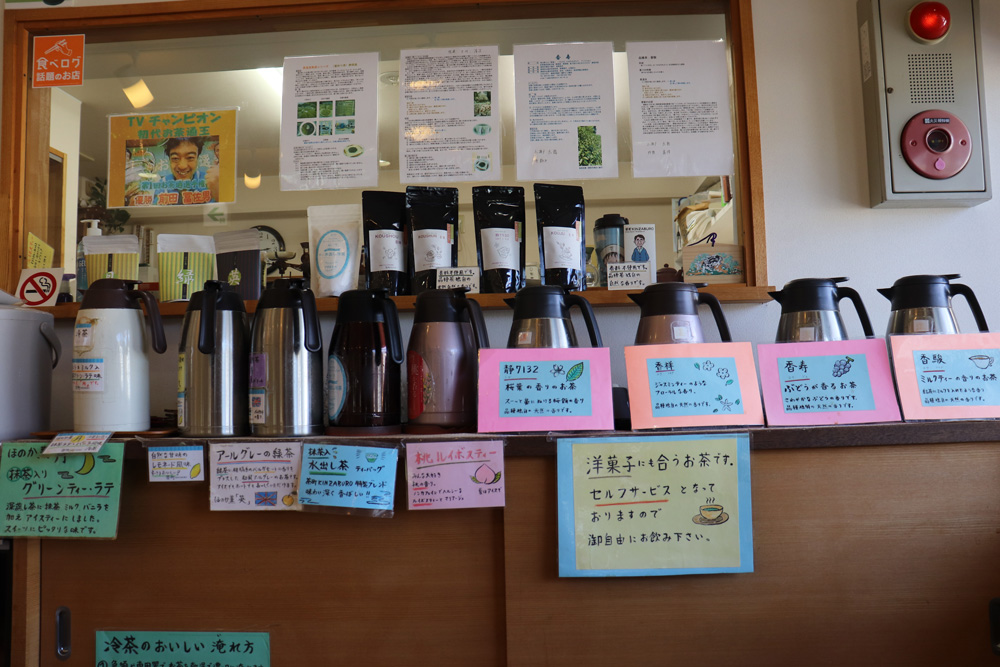
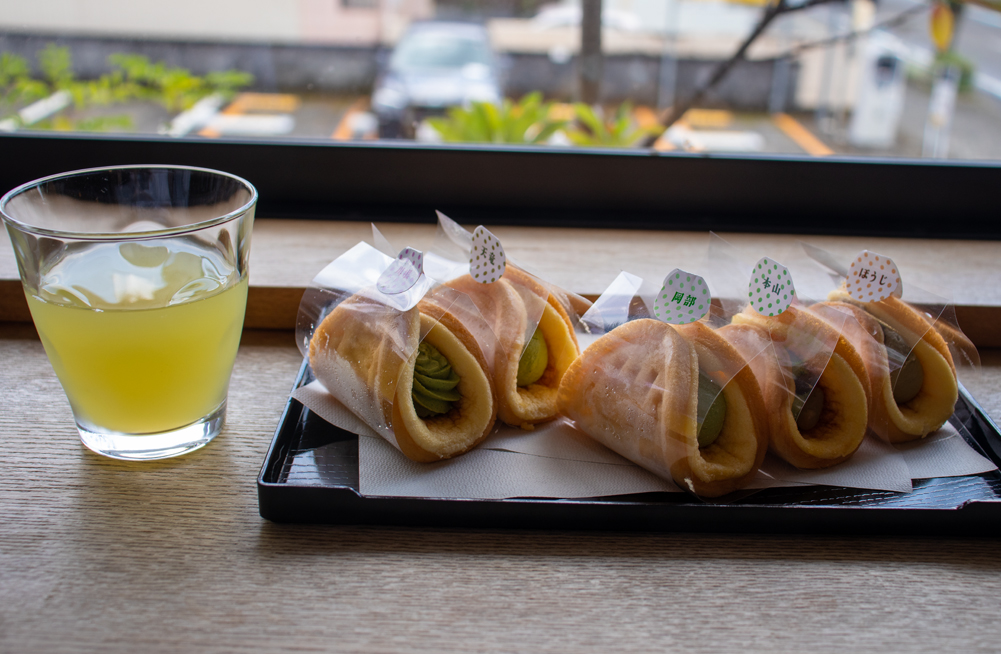
For more information about this shop, click here >>
【Address】27, Dotayu-cho, Aoi-ku, Shizuoka City, Shizuoka Prefecture, 420-0018, Japan.
【Business hours】9:30-18:00, Sundays and public holidays 10:00-17:00 (eat-in space closes one hour before closing).
Closed on Wednesdays.
【Web Site】https://kinzaburo.com/
【Access】10 min drive from Shizuoka Station.
【Parking】Available.
Matcha Zenzai【Charaku -Honyama Matcha- 】
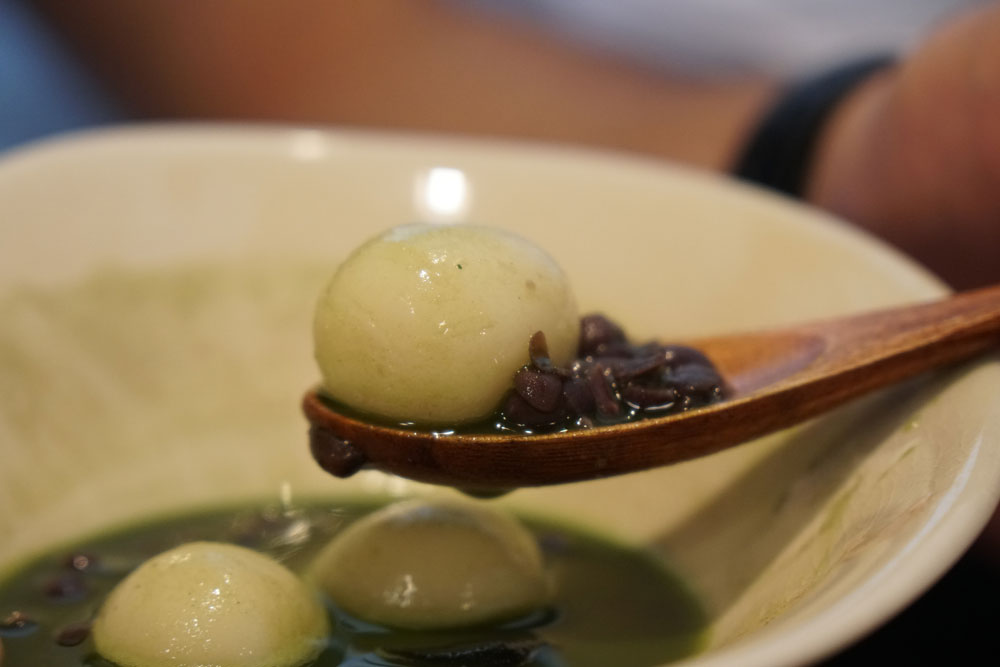
Nestled in Okitsu, Shimizu Ward, Shizuoka Prefecture, the Japanese-style café Charaku carries the charm of tradition and innovation. Okitsu, the birthplace of Japanese anko (sweet red bean paste) making, is also home to this remarkable establishment.
Founded in 2005 by Harumasa Yamanashi, the third-generation head of the esteemed tea wholesaler Yamanashi Shoten (established in 1925), Charaku was born from a heartfelt vision: To introduce the younger generation to the unparalleled joy of tea brewed in a teapot amidst the rise of bottled tea culture.
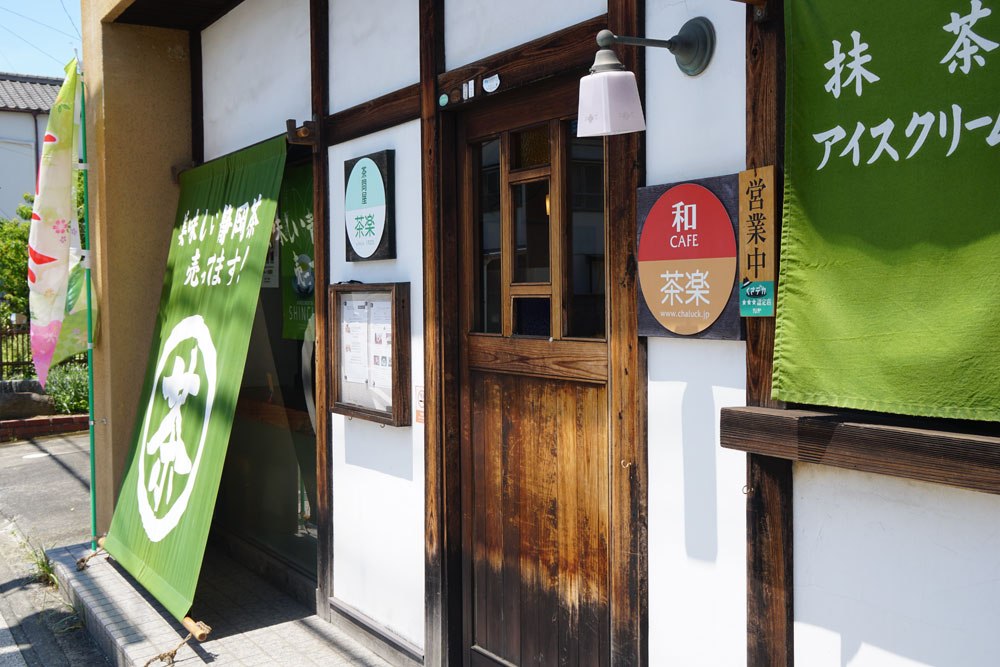
Charaku’s signature dish, the matcha oshiruko, results from countless hours of refinement and dedication. This innovative dessert combines the café’s homemade red bean paste, premium Shizuoka matcha, and perfectly crafted shiratama rice dumplings.
According to the owner, Every element of this dish is made with care, delivering a deep sense of satisfaction to those who savor it.
The balance of flavors is extraordinary: the chewy softness of the shiratama, the earthy richness of matcha, and the gentle sweetness of azuki beans are harmonized with a subtle hint of salt, creating a delightful three-dimensional taste. Ideal as a post-meal dessert or a relaxing afternoon treat, the matcha oshiruko is a must-try for anyone visiting Charaku.
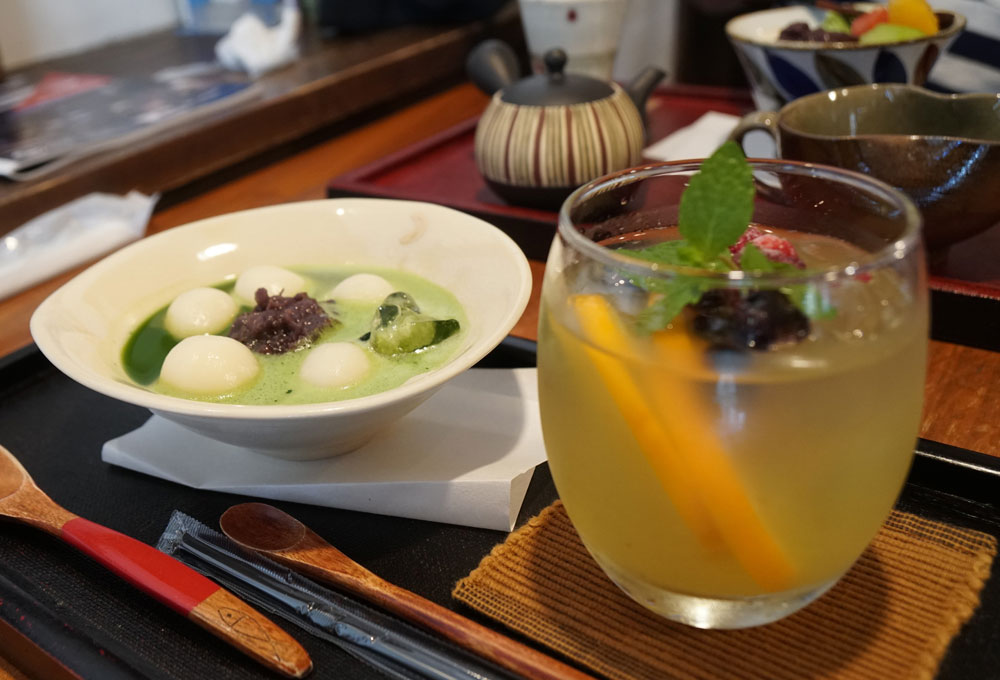
At Charaku, you can experience the fusion of traditional Japanese flavors with a contemporary twist. Made with fresh local ingredients and crafted with meticulous care, the matcha oshiruko offers a truly special culinary experience.
Whether you’re a tea enthusiast or simply searching for a unique and memorable dessert, Charaku invites you to enjoy the timeless charm of Japanese tea culture in a modern setting.
For more information about this shop, click here>>
【Address】158-1, Okitsu Honmachi, Shimizu-ku, Shizuoka City, 424-0205
【Business hours】Lunch time: 11:30-14:00
Café menu: 10:00-17:00 (last order 16:30)
Closed: Check the calendar on the website.
【Web Site】http://chaluck.jp/
【Access】Approximately 10 minutes walk from Okitsu Station on the JR Tokaido Honsen Line.
【Parking】Available.
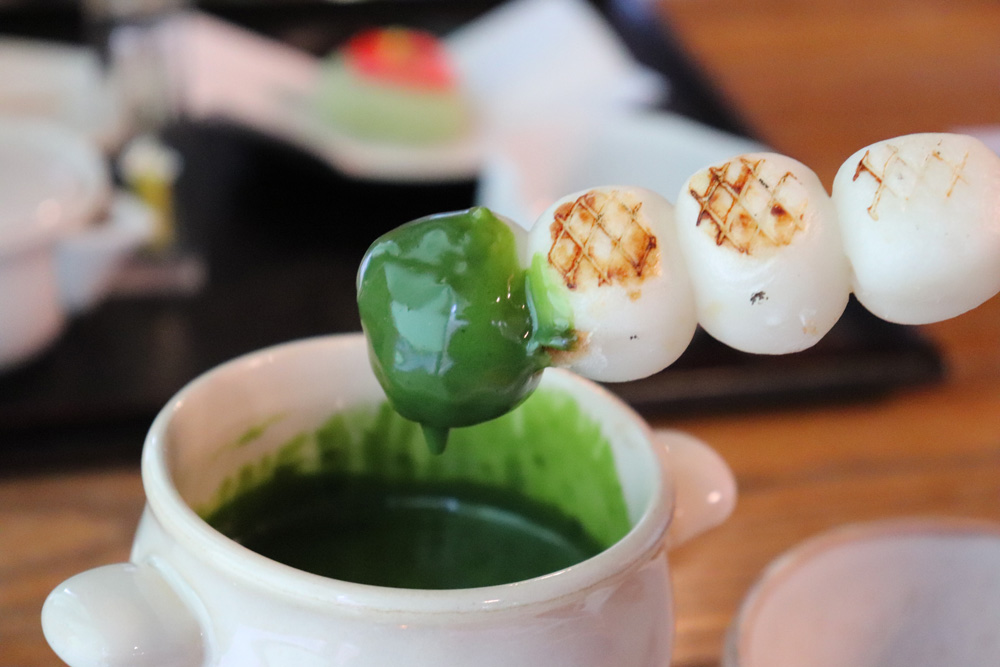
Cha no Me is a Japanese green tea cafe in a quiet spot in Aoi Ward, Shizuoka City, surrounded by the Warashina River and the mountains of Ohara. This cafe was opened by Morita Tea, a long-established company with over 70 years of history, striving to showcase the deliciousness of tea brewed in a teapot in an age where bottled tea is the norm.
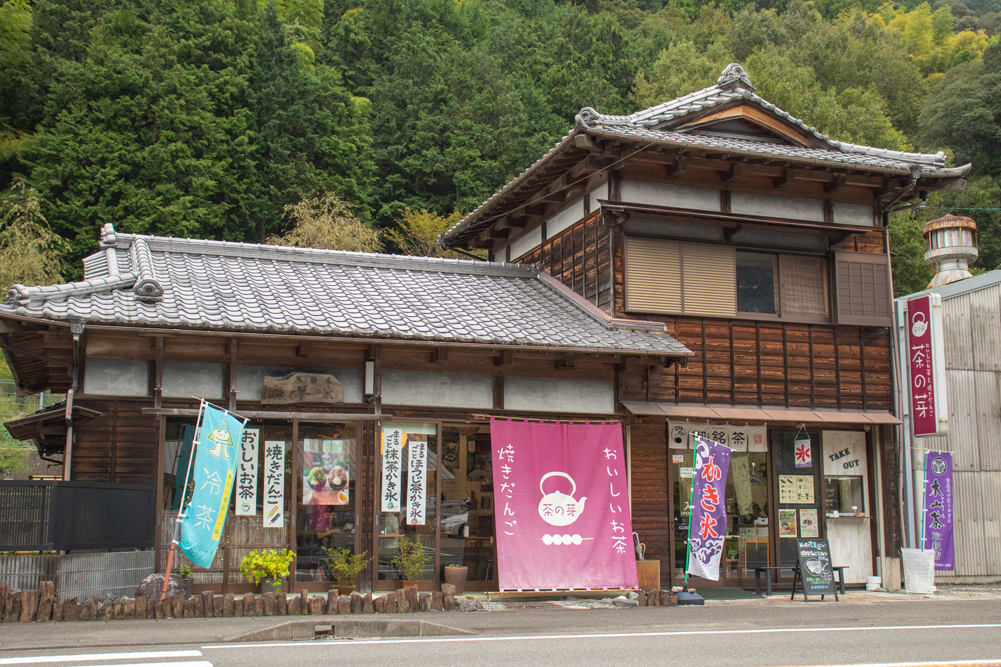
Our recommended matcha sweet is the Matcha Chocolate Fondue (available for a limited period from October to May). Rich matcha chocolate, with its beautiful deep green color, speaks volumes about the deep aroma and flavor of matcha from its appearance alone.
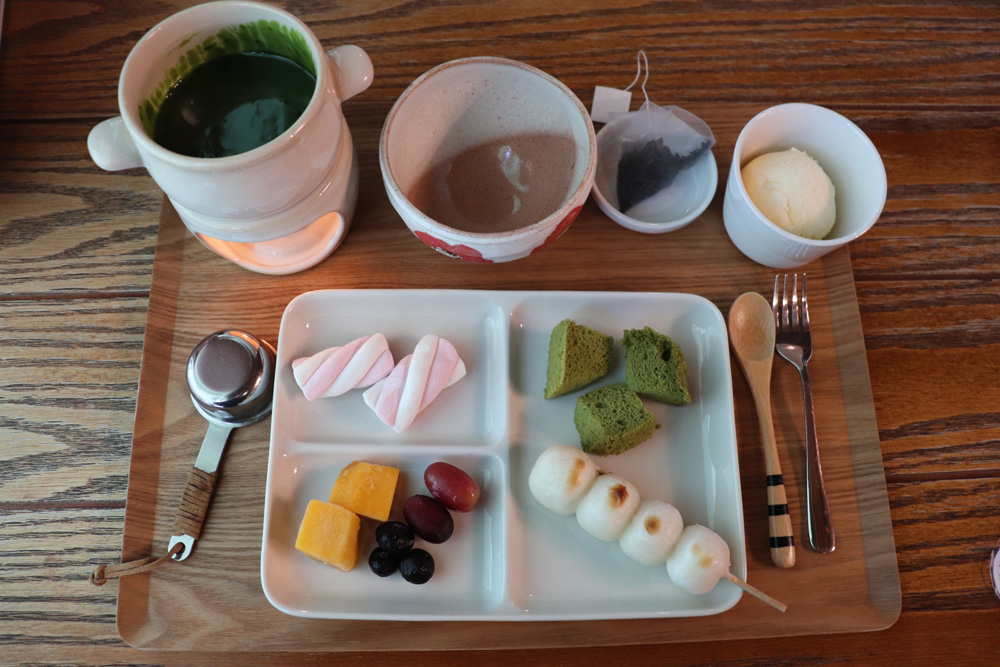
Enjoy the warm, rich matcha chocolate sauce by dipping sweet rice dumplings, green tea chiffon cake, marshmallows, and fruits. It is a popular menu item that is as visually appealing as it is delicious. The deep matcha flavor and the chocolate’s sweetness combine to create a perfect harmony.
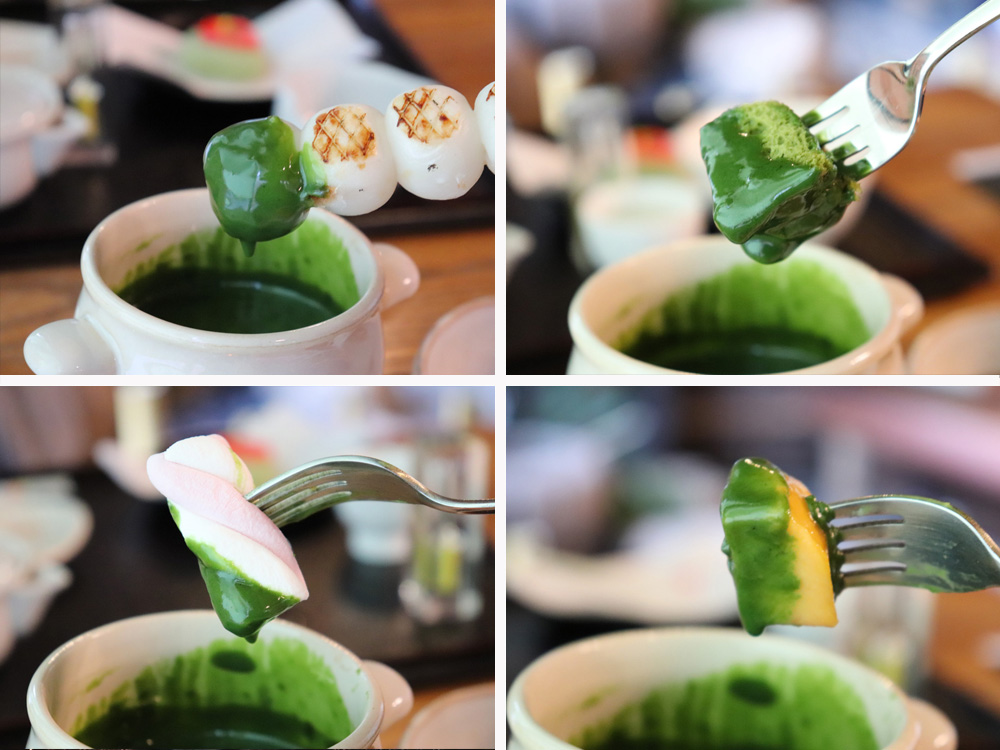 ▲All matcha used in ChanoMe’s menu, including the fondue, is “Okumidori,” cultivated in Morita Seicha’s own tea gardens.
▲All matcha used in ChanoMe’s menu, including the fondue, is “Okumidori,” cultivated in Morita Seicha’s own tea gardens.
After the fondue, pour the remaining matcha chocolate over the ice cream. Enjoy the delightful contrast between warm matcha chocolate and cold, sweet ice cream.
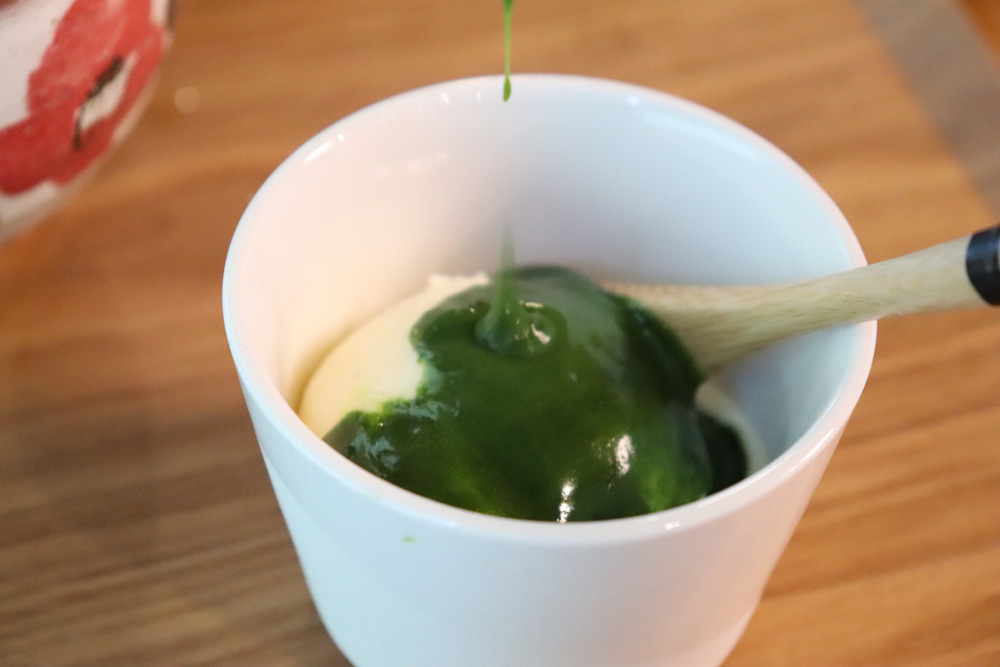
It is a must-try for matcha lovers and those seeking a new, sweet experience.
For more information about this shop, click here >>
【Address】1827 Ohara, Aoi Ku, Shizuoka City, 421-1314, Japan
【Business hours】10:00-17:00
Closed on Mondays and the fourth Tuesday of the month.
【Web Site】https://www.instagram.com/cha_no_me.cafe/
【Access】Take National Route 362 towards Warashina by car (approx. 30 mins).
【Parking】 Available(4 spaces)
Matcha Soft Serve【Omatcha Kondou no Shokudou -Honyama Matcha/Yame Matcha-】
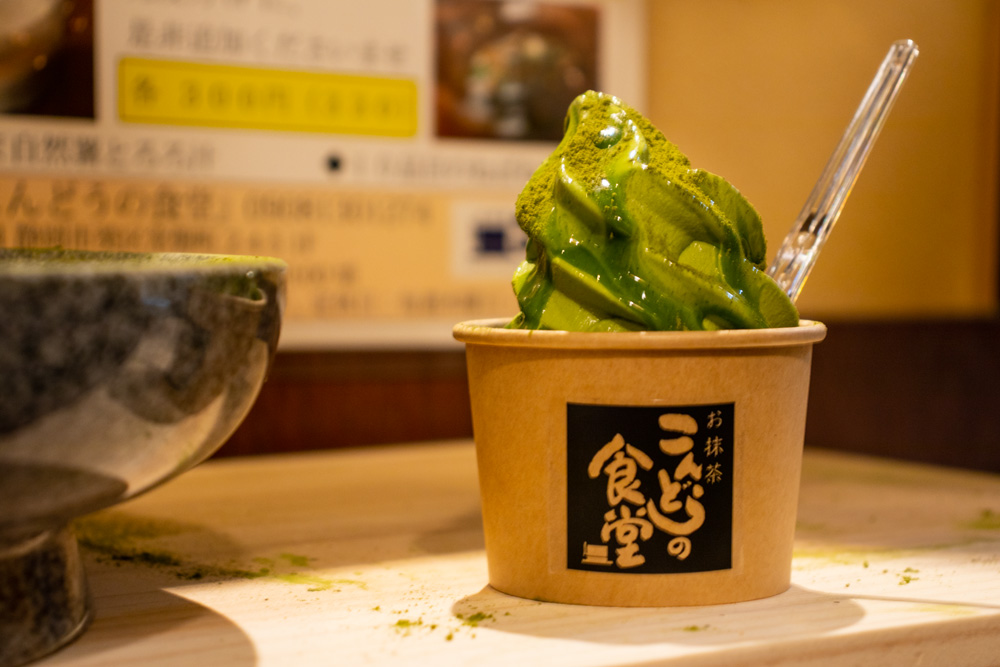
Omatcha-Kondo-no-Shokudo Restaurant stands out as a creative Japanese dining destination, located just a 10-minute walk from Shizuoka City Hall along the picturesque Aoba Symbol Road. The owner, Yusuke Kondo, combines his expertise as a former French chef with his credentials as a certified Japanese tea instructor to craft a dining experience masterfully fusing food and tea.
The restaurant is highly regarded for its unique approach and refined style.
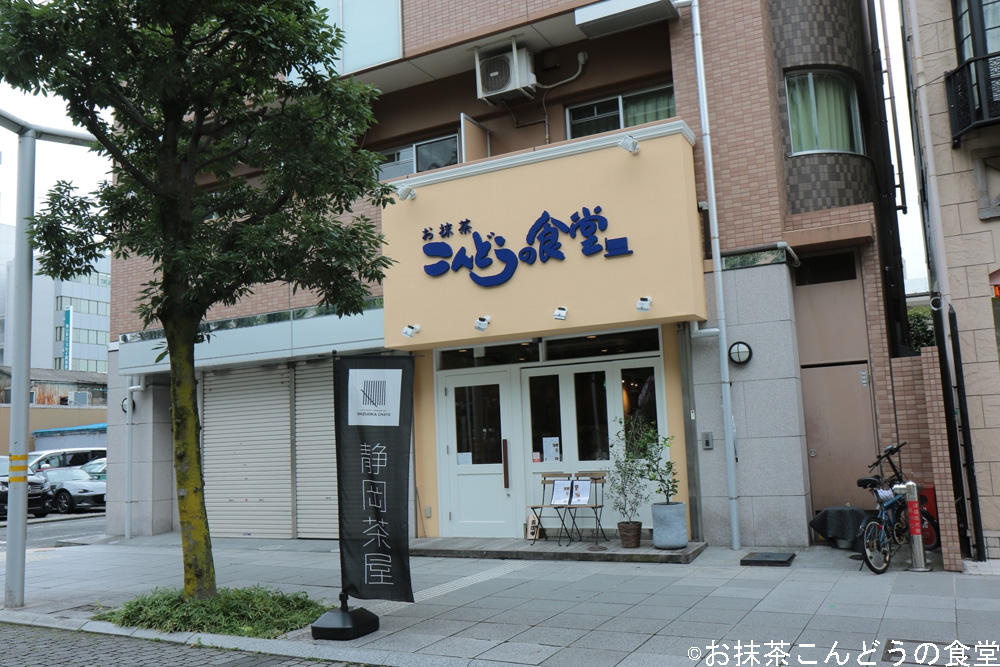
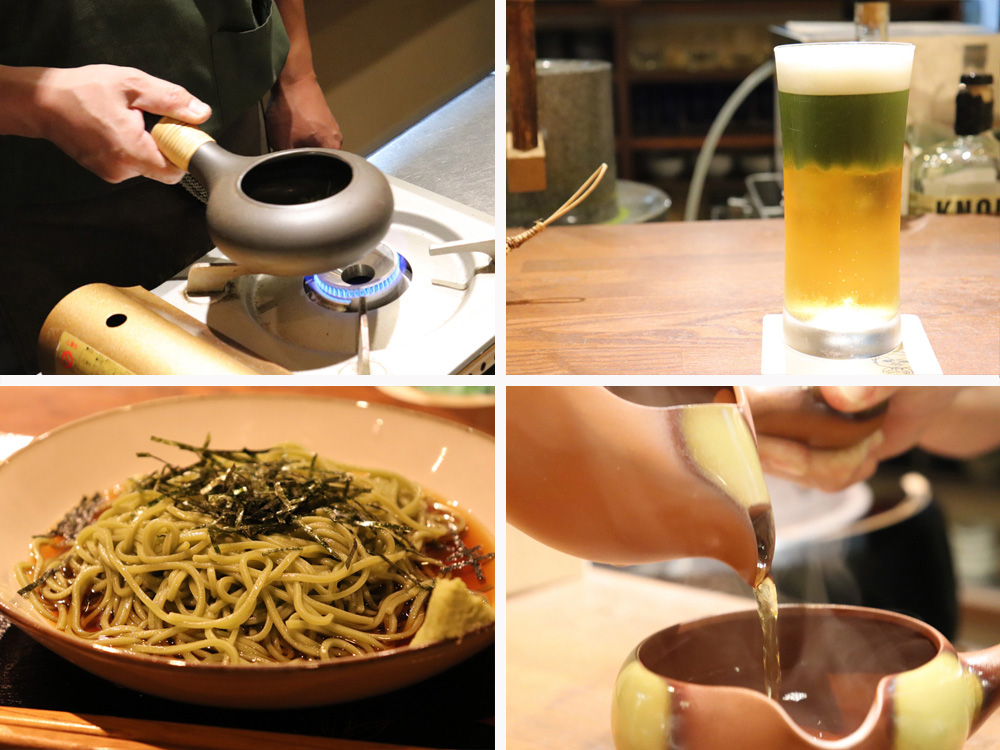
One of the standout offerings on the dessert menu is matcha soft serve, a luxurious creation showcasing Mr. Kondo’s artistry. This indulgent ice cream is made using a meticulously crafted blend of Shizuoka Motoyama matcha and Fukuoka Yame matcha, with proportions uniquely tailored by Mr. Kondo himself.
The soft serve is then topped with homemade matcha sauce and freshly ground matcha powder from a traditional stone mill, delivering an unparalleled richness and aroma that captures the essence of premium Japanese tea.
(*Please note: This dessert is available for takeaway only and cannot be consumed on the premises.)
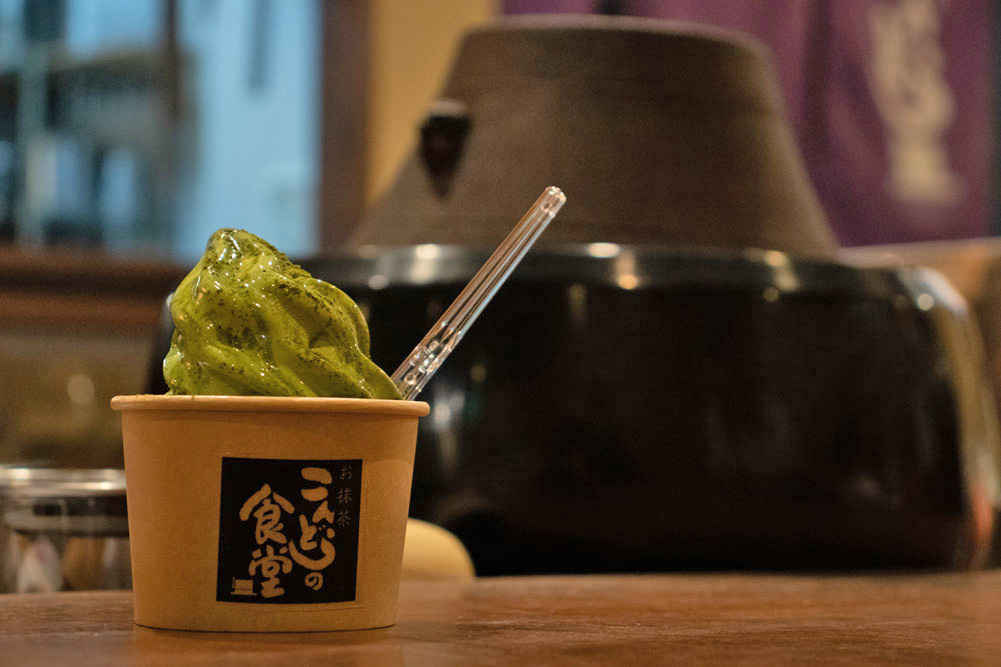
Mr. Kondo’s perspective as a former French chef brings a fresh and innovative dimension to Japanese tea. His menu celebrates the natural flavors of Shizuoka’s local ingredients while highlighting the unique qualities of carefully selected teas. This combination has captivated the hearts of tea enthusiasts and food lovers across Shizuoka.
Why not treat yourself to a unique culinary journey celebrating Japanese tea’s rich traditions, reimagined through gourmet cuisine? At Omatcha-Kondo-no-Shokudo Restaurant, every dish and dessert promises a moment of delight and a deeper appreciation for the flavors of Shizuoka.
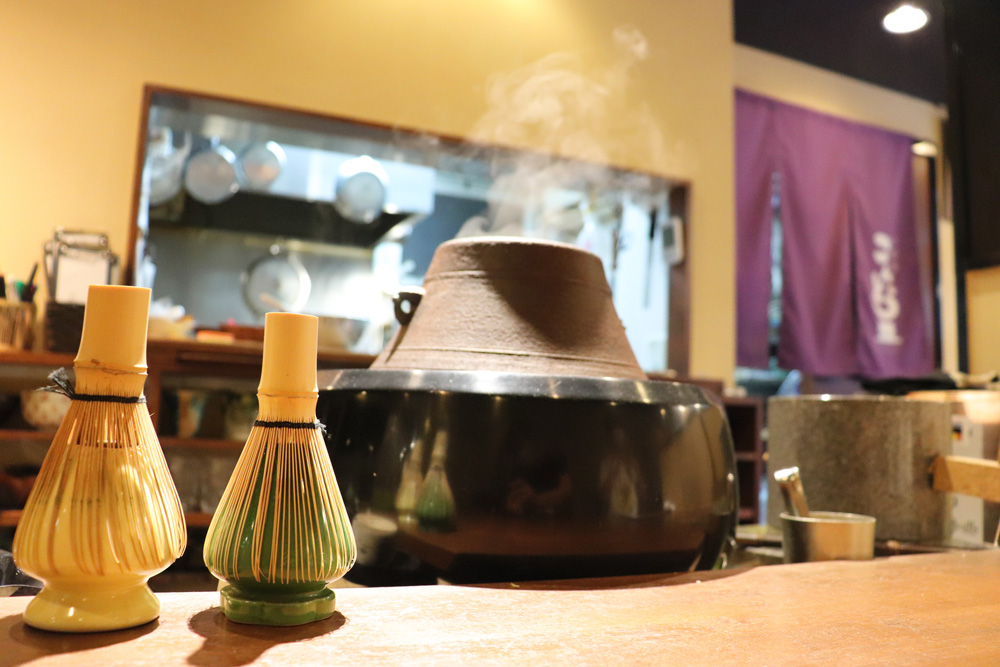
For more information about this shop, click here>>
【Address】1F Tokiwa, 2-4-5 Tokiwa-machi, Aoi-ku, Shizuoka City, Shizuoka Prefecture, 420-0034, Japan
【Business hours】Lunch 11:30-13:30 (LO 13:15)
Dinner 18:00-22:00 (LO 21:00)
Closed on Thursdays and the third Wednesday of the month.
【Web Site】https://omaccha-kondo.amebaownd.com/
【Access】15min walk from Shizuoka Station.
【Parking】No parking (Pay parking available nearby).
OMACHI Set【T’s green omachi -Shimada Matcha-】
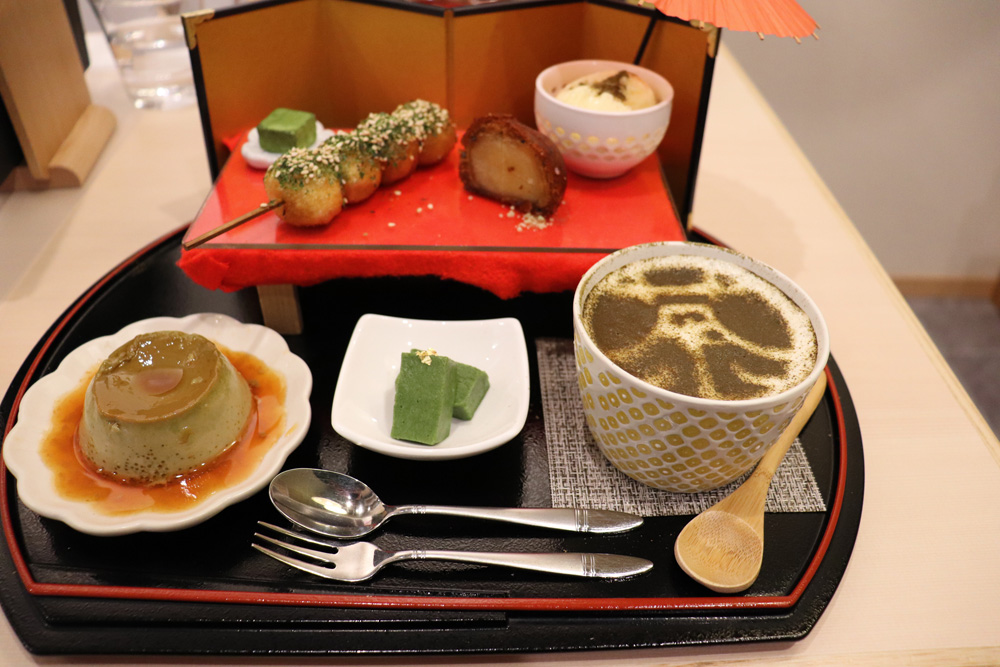
T’s Green Omachi is a café in Shichiken-cho, Aoi-ku, Shizuoka City. This café uses fresh, deep-steamed green tea leaves sourced directly from a tea farm in Kanaya, Shimada City, with sweets meticulously prepared to complement it perfectly. While the taste is undoubtedly delicious, the stunning decorations on the sweets have gained popularity on social media, attracting a bustling crowd of customers, especially young women.
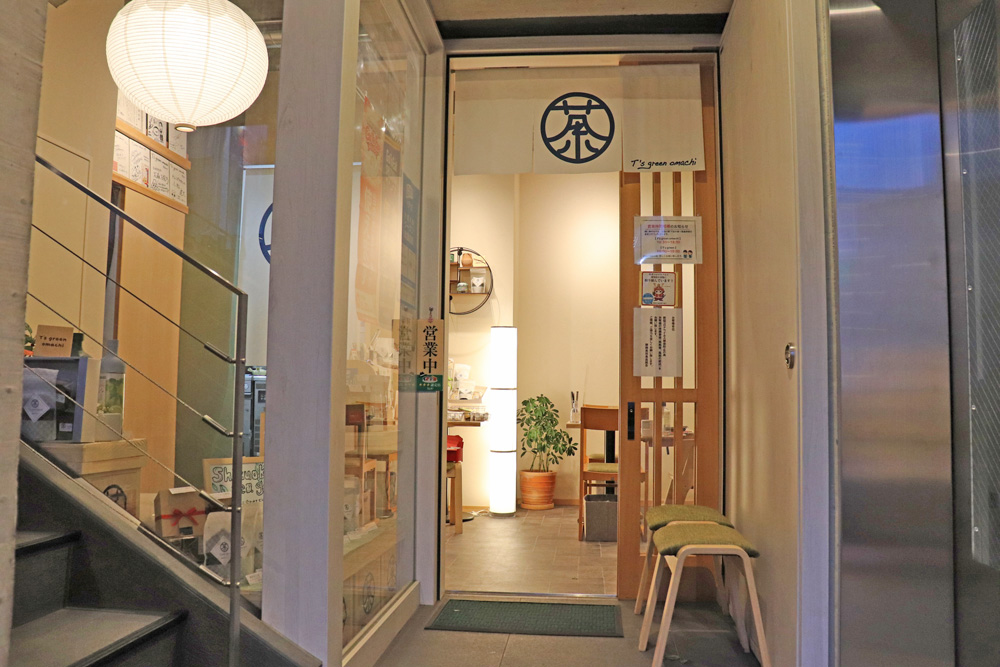
Our recommended matcha sweets are featured in the Omachi Set, including green tea raw chocolate, deep-fried dango, matcha milk warabimochi, karinto manju, tea pudding, and a drink from the menu.
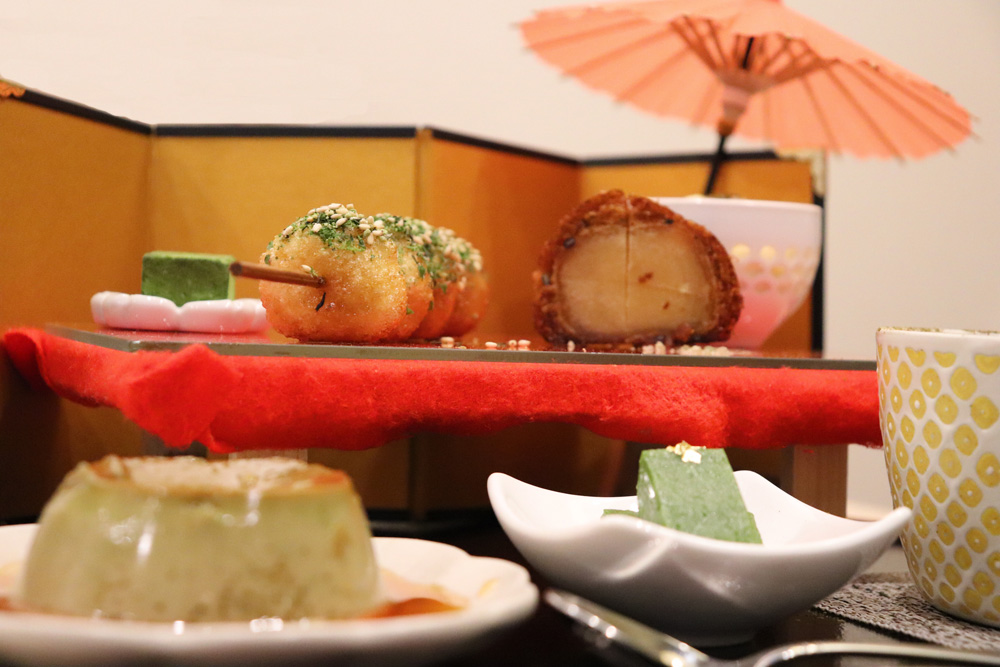
The presentation is so beautiful that you’ll be tempted to take photos. If you order a latte, the word “cha,” artistically drawn on the surface, provides you with the perfect social media snap.
T’s Green Omachi is situated downtown and has a youthful female clientele. The stylish and glamorous menu features a wide selection of dazzling green tea sweets. Be sure to visit for a unique and sparkling tea experience— only in Shizuoka.
For more information about this shop, click here>>
【Address】OMACHI BIRU. 1F, 16-7 Shichiken-cho, Aoi-ku, Shizuoka City, Shizuoka Prefecture, 420-0035, Japan
【Business hours】10:00-19:00
Regular closing days: No regular holidays.
【Web Site】https://www.instagram.com/ts.green.omachi.staff/
【Access】About 15 minutes walk from Shizuoka City Hall.
【Parking】Not available (paid parking available nearby)
A Harmonious Blend: Matcha, Coffee, and Cream Cheese【NO’AGE concentré -Shimada Matcha-】
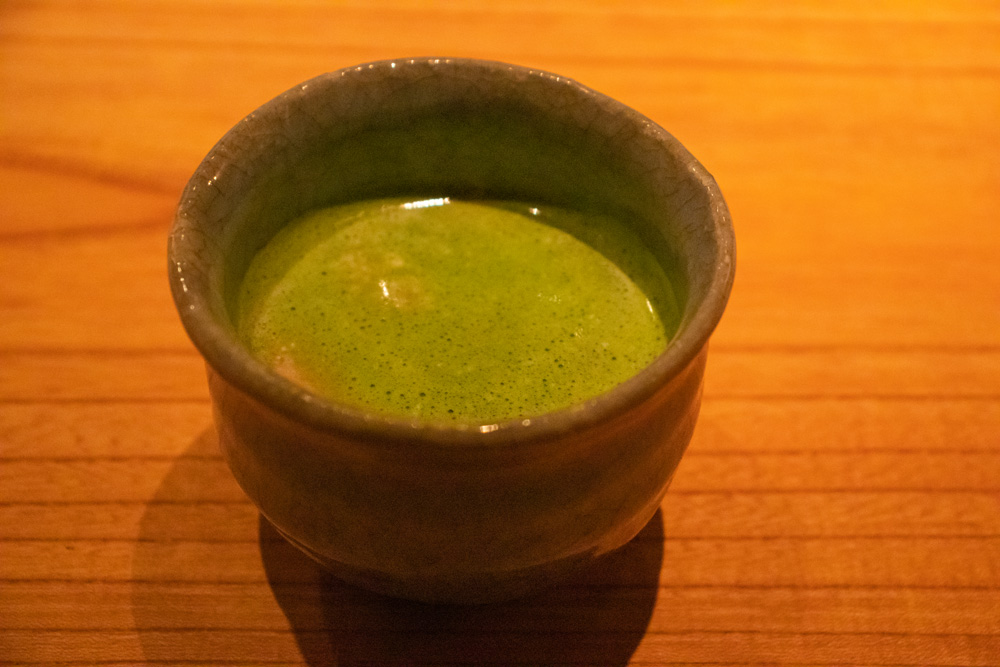
At NO’AGE concentré, you can enjoy a delightful pairing of Japanese tea, cocktails, and food. The owner and bartender, Masamichi Itani, is a talented individual who has won grand prizes at cocktail competitions and has been featured in numerous cocktail specialty books. People from Japan and worldwide visit to experience the captivating tea cocktails and pairings he creates.
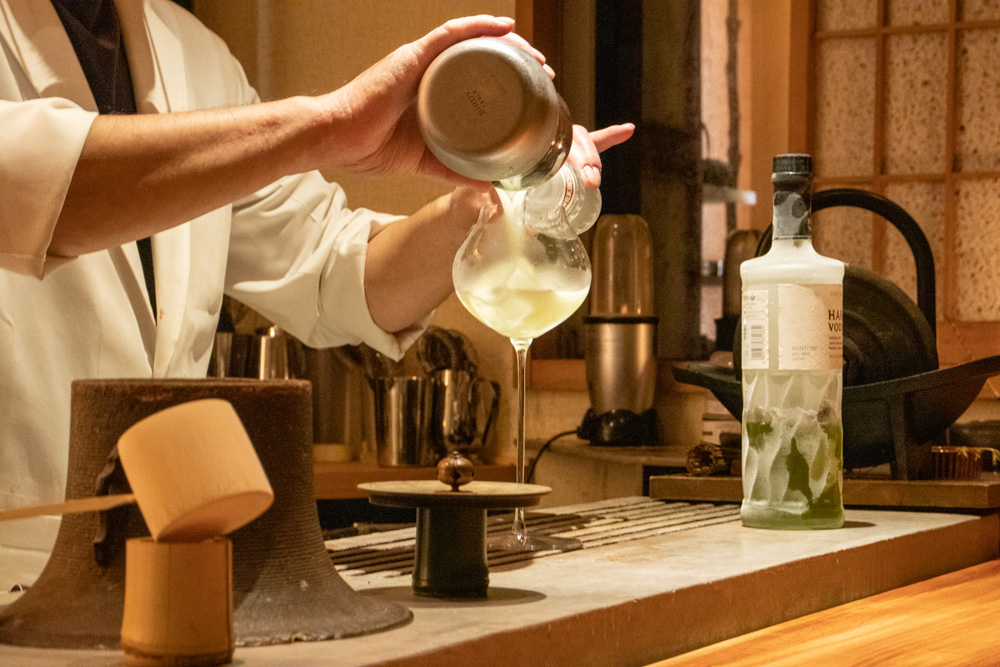
We highly recommend the dessert cocktail The Relationship Between Matcha, Coffee, and Cream Cheese. This unique drink features organic matcha powder sourced from Shimada in Shizuoka Prefecture. The coffee and cream cheese beautifully complement the deep flavor of the matcha. With each sip, the aroma of orange gently develops, completing a truly luxurious taste experience.
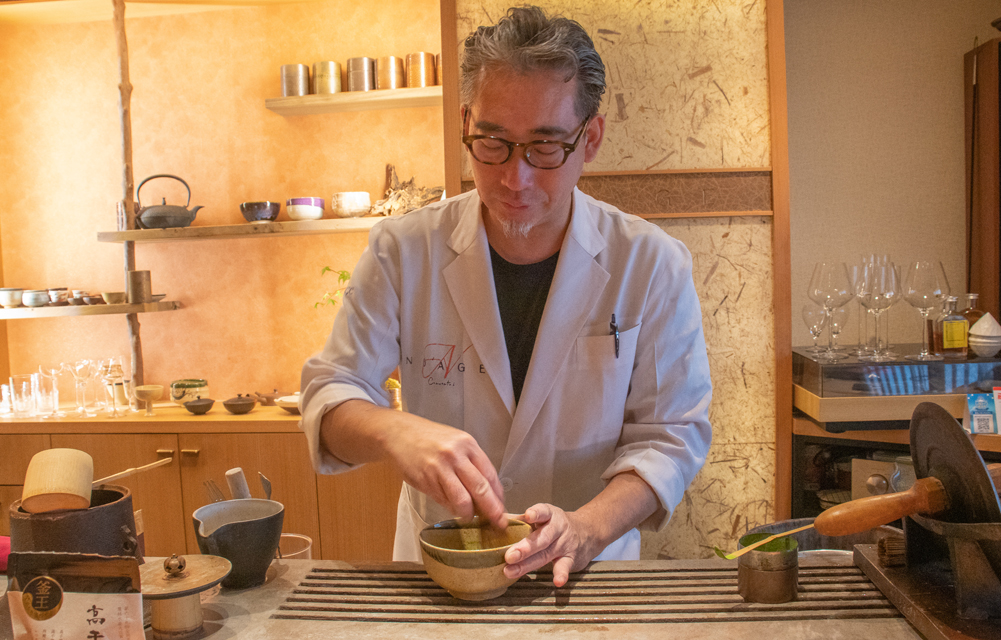
At NO’AGE concentré, we primarily recommend tea-based cocktails. Still, one of the bar’s unique charms is its flexibility to cater to customers’ tastes, including non-alcoholic options. If you make a reservation in advance, you can also enjoy perfectly paired lunches and dinners. As a bartender, Mr. Itani skillfully shakes the shaker with lively action; as a tea master, he carefully manipulates the tea utensils with a sense of calm; and as a chef, he masterfully handles the flames with captivating charm.
You will be mesmerized by every move he makes.
Come and try the one-of-a-kind tea cocktail pairings only experienced here.

For more information about this shop, click here >>
【Address】 1F, 2-5-12 Takasho, Aoi-ku, Shizuoka City, Shizuoka Prefecture, 420-0839, Japan.
【Business hours】BAR TIME: Every Friday and Saturday from 21:00 to 24:00. Lunch and dinner by reservation only
Closed on Mondays and the third Sunday of the month.
【Web Site】https://www.barnoage.com/
【Access】15min walk from Shizuoka Station
【Parking】Not available (paid parking available nearby)
Kakegawa Matcha Parfait【Nihoncha Kimikura -Kakegawa Matcha-】
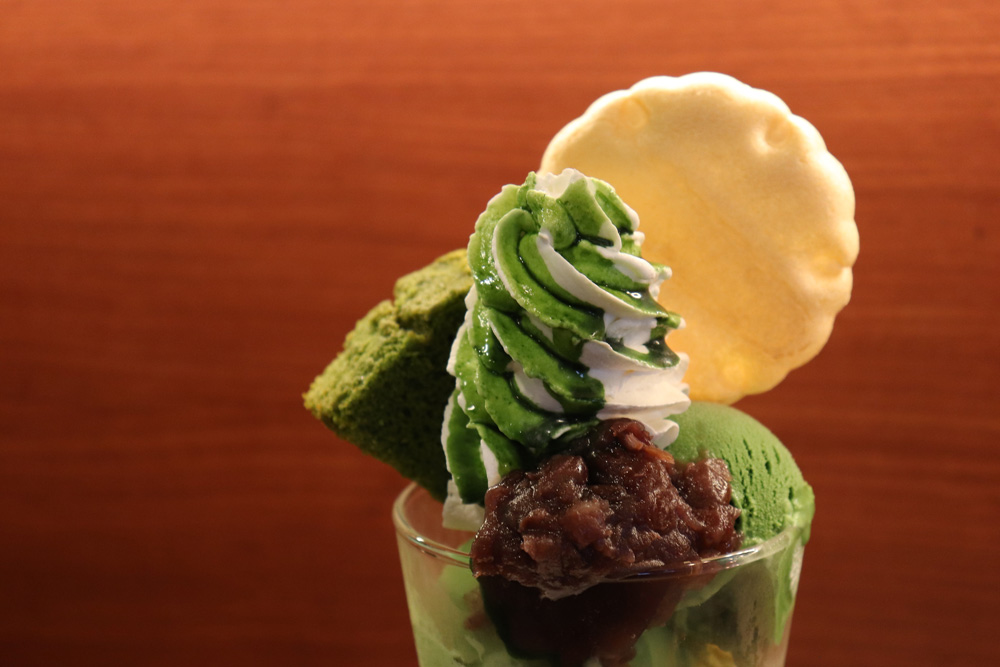
Located in Kakegawa City in western Shizuoka Prefecture, Nihoncha Kimikura is a Japanese tea specialty store operated by Maruyama Tea, a long-established tea company with roots dating back to 1933. Kakegawa is renowned for producing deep-steamed green tea and has recently gained recognition for its high-quality matcha. At Nihoncha Kimikura, matcha sweets crafted from authentic Kakegawa matcha have become a local favorite.
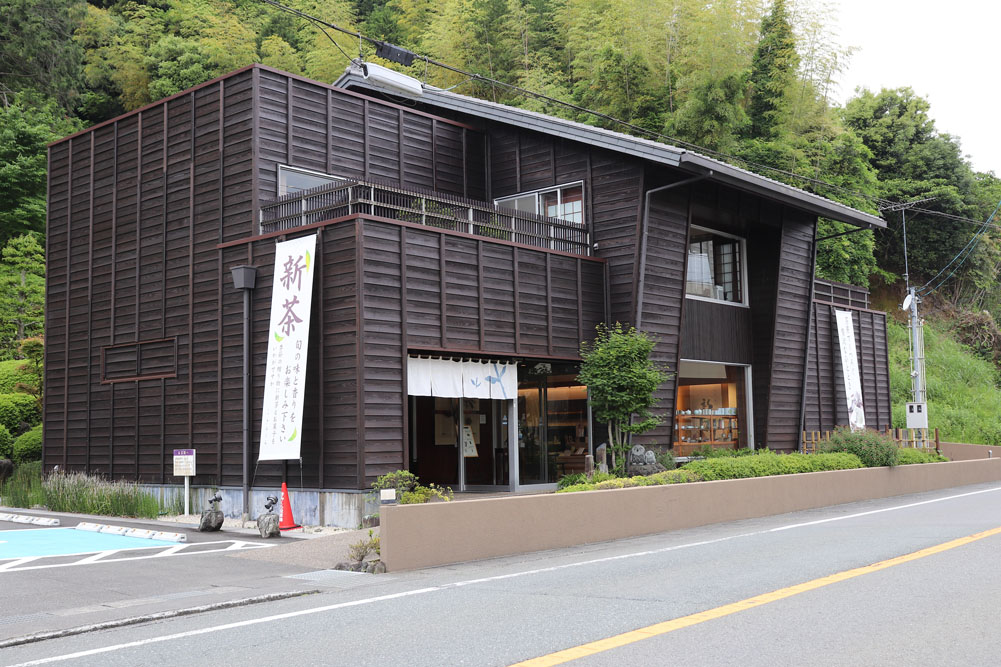
Among its offerings, the Kakegawa Matcha Parfait stands out as a true masterpiece. This luxurious dessert features two types of matcha ice cream with varying richness, generously layered to showcase the full-bodied flavors of premium Kakegawa matcha. The parfait delights the senses with a symphony of textures and flavors, including whipped cream topped with matcha sauce, agar jelly, chocolate, matcha granola, fluffy matcha cake, and silky matcha jelly.
(*Please note: The ingredients and presentation of the parfait may vary by store.)
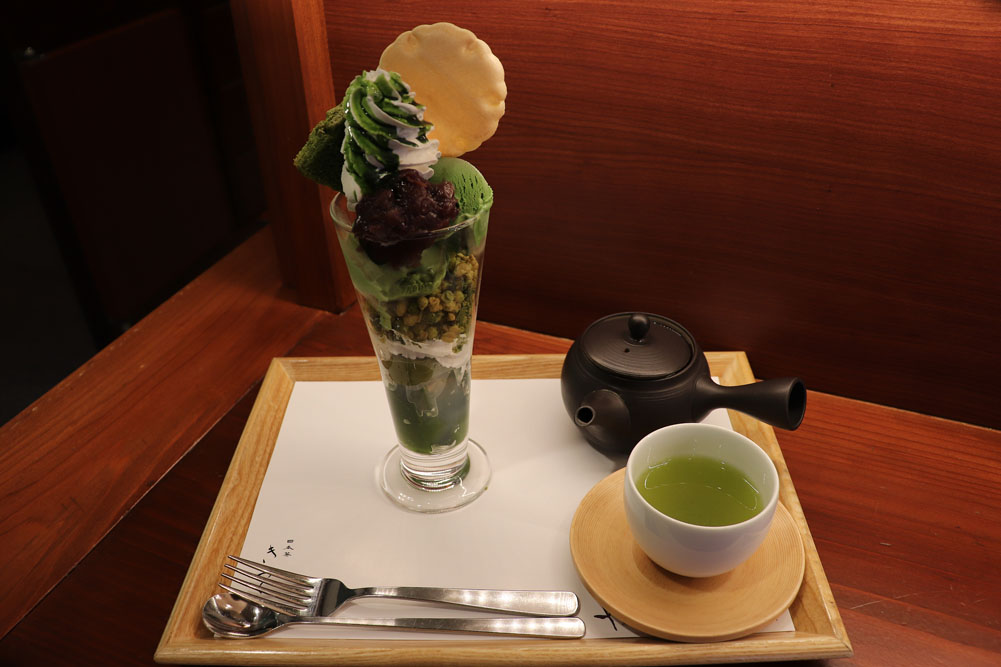 ▲ The Kakegawa Matcha Parfait is a visual delight, with its layers of various matcha sweets creating a beautiful gradation.
▲ The Kakegawa Matcha Parfait is a visual delight, with its layers of various matcha sweets creating a beautiful gradation.
The Kakegawa Matcha Parfait is as stunning as it is delicious, with its vibrant green hues and elegant layers creating a beautiful gradation of matcha-infused delights. It’s the perfect indulgence for those seeking an authentic taste of Kakegawa’s matcha craftsmanship.
In 2023, the new matcha brand “matcha KIMIKURA” was launched to share the charm of Kakegawa matcha with the world. The brand boasts two convenient locations: an organic matcha stand on the first floor of the Shizuoka Station Building, Parché, and a flagship store at Kakegawa Station. Both stores are directly connected to their respective stations, making them easily accessible to visitors.
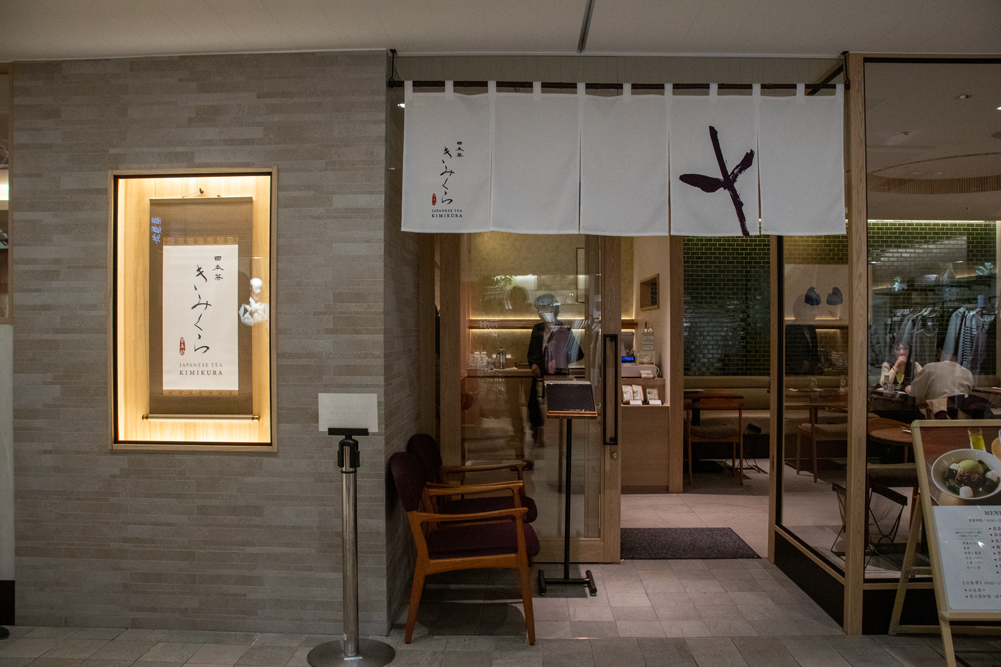
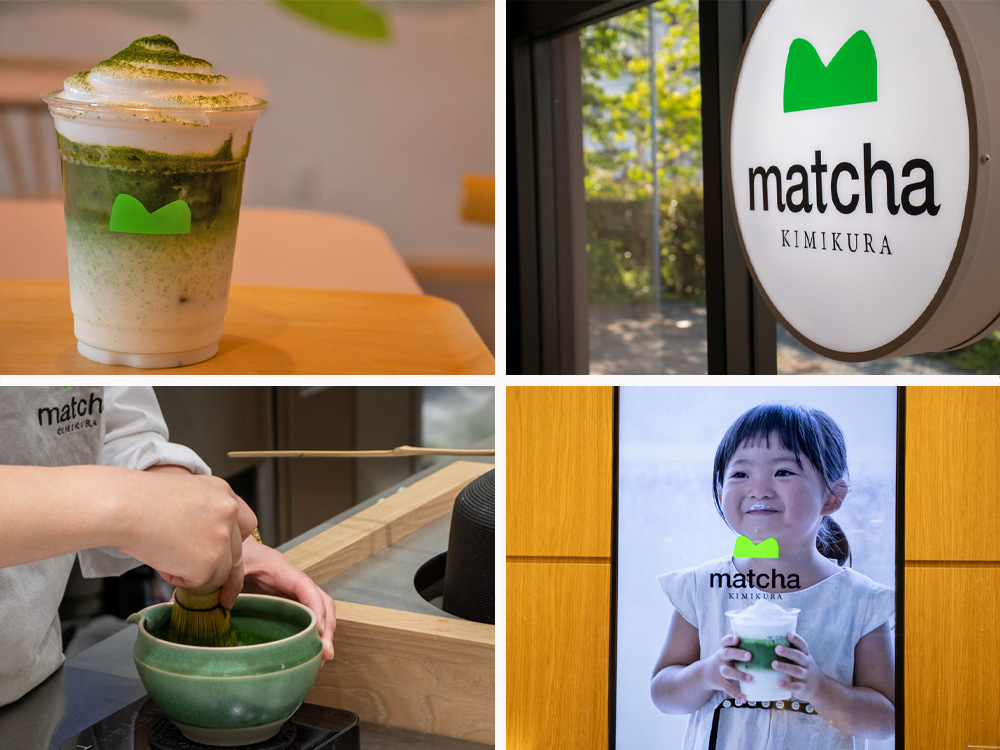
For more information about this shop, click here>>
【Address】510-5 Itazawa, Kakegawa, Shizuoka 436-0016
【Business hours】Opening hours: 10:00 – 18:00 (LO 17:30)
Closed: Year-end and New Year holidays
【Web Site】https://kimikura.jp/honten/
【Access】8 minutes by car from Kakegawa Station.
【Parking】Available.
Kudzu Dorayaki【Cha no Niwa -Kakegawa Matcha-】
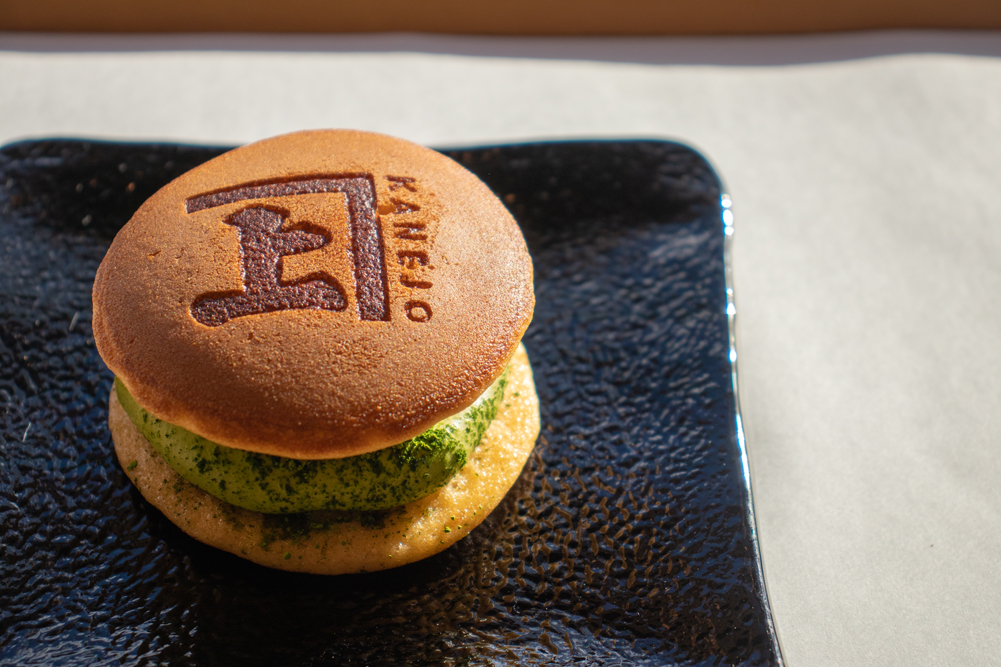
The Kamiuchida district in Kakegawa City, Shizuoka Prefecture, is renowned for producing some of the highest-quality tea in a region already famous for its deep-steamed green tea. Nestled in this idyllic area is Cha no Niwa (Tea Garden), a Japanese tea café operated by Sasaki Tea, a company with over 100 years of history. This unique café combines a tea plantation, a tea factory, and a shop, offering visitors an immersive, hands-on tea experience.
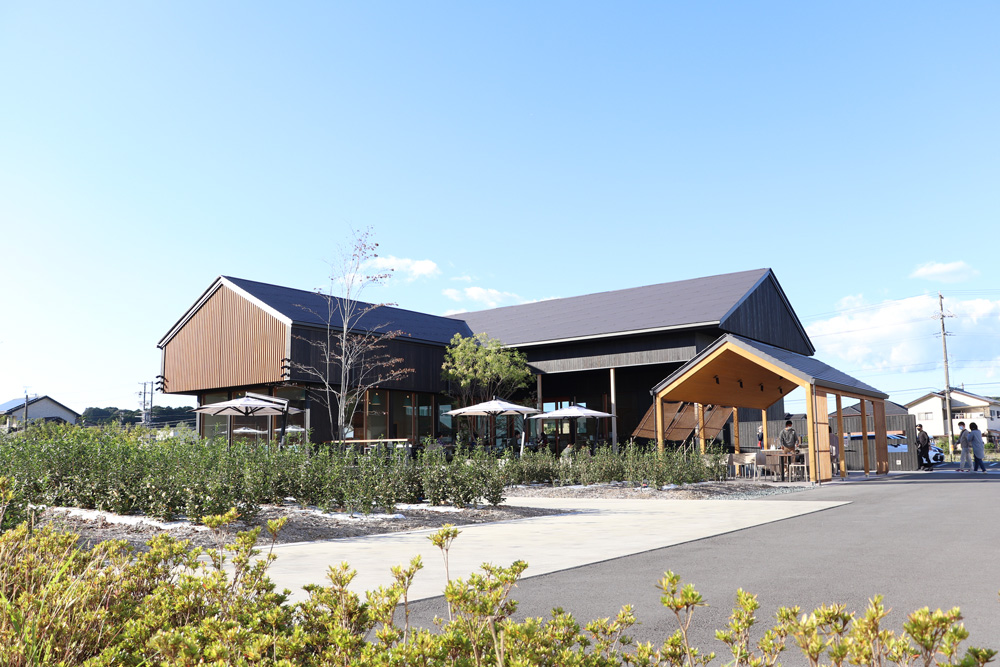
One of Cha no Niwa’s signature creations is the Kudzu Dorayaki (Matcha Cream)—a mini-sized dorayaki specially crafted for the café. The moist, fluffy, and slightly savory dough pairs perfectly with the sweet Hokkaido red bean paste. Inside, a rich matcha cream tasting of Kakegawa’s premium green tea is combined with chewy kudzu mochi crafted from Yoshinohonkuzu (authentic kudzu starch).
Each bite delivers a harmonious blend of sweetness, bittersweet tea notes, and satisfying textures.
Beyond the matcha cream, their Kudzu Dorayaki is also available in three other delectable flavors: roasted green tea (hojicha) cream, black sugar, and sweet soy flour cream. With options to suit your mood or preference, each flavor offers a distinct twist on this elegant treat.
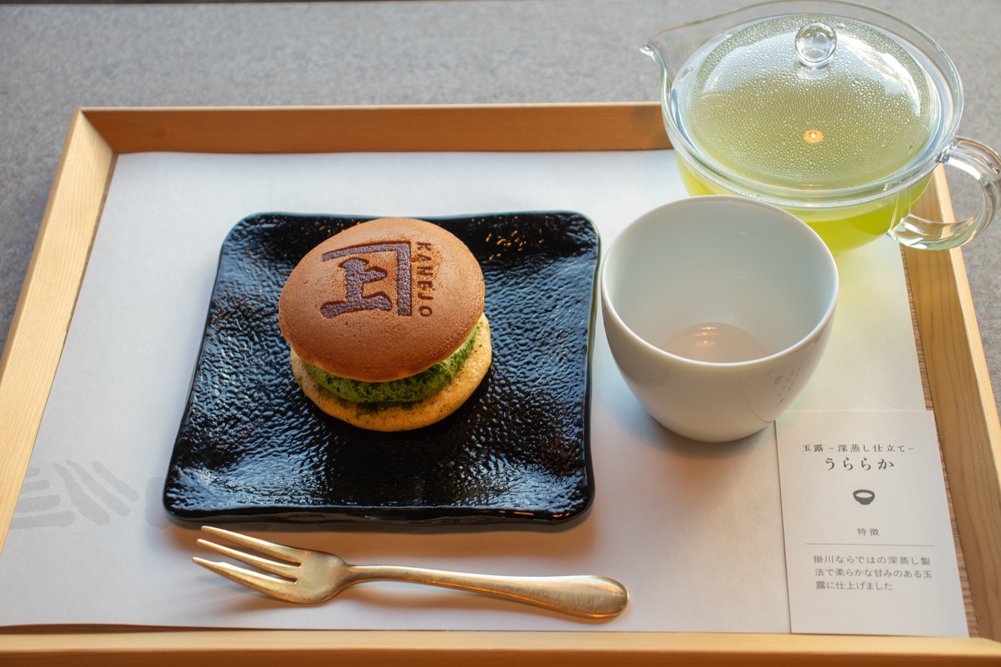
In addition to its luxurious flavor, the Kudzu Dorayaki is thoughtfully designed in a compact, handy mini size. The design ensures ease of eating without worrying about ruining makeup or expressions, making it an excellent choice for on-the-go enjoyment or as a sophisticated gift for someone special.
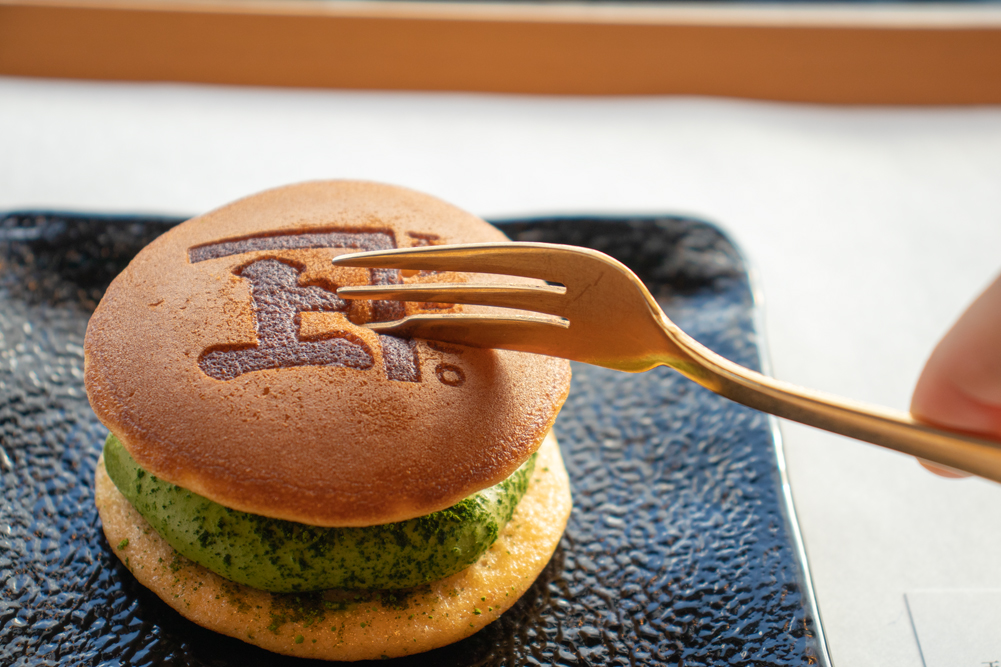
The matcha cream version is finished with a fine matcha powder dusting, enhancing the experience with a pleasant aftertaste that balances the sweetness with the bittersweet essence of premium matcha.
For more information about this shop, click here>>
【Address】389-1, kamiuchida, kakegawa City, Shizuoka Prefecture, 436-0012, Japan
【Business hours】Shop 10:00−18:00
Last order 17:00
Closed: Wednesday
【Web Site】https://chanoniwa.com/
【Access】 From Tomei Expressway, 5 minutes from Kakegawa IC in the direction of Nagoya
From Tokyo, 5 minutes from Kikukawa IC.8 minutes by cab from JR Kakegawa Station South Exit (Shinkansen Exit)
【Parking】Available.
Nonozukushi【Osadaen -Mori no Matcha-】
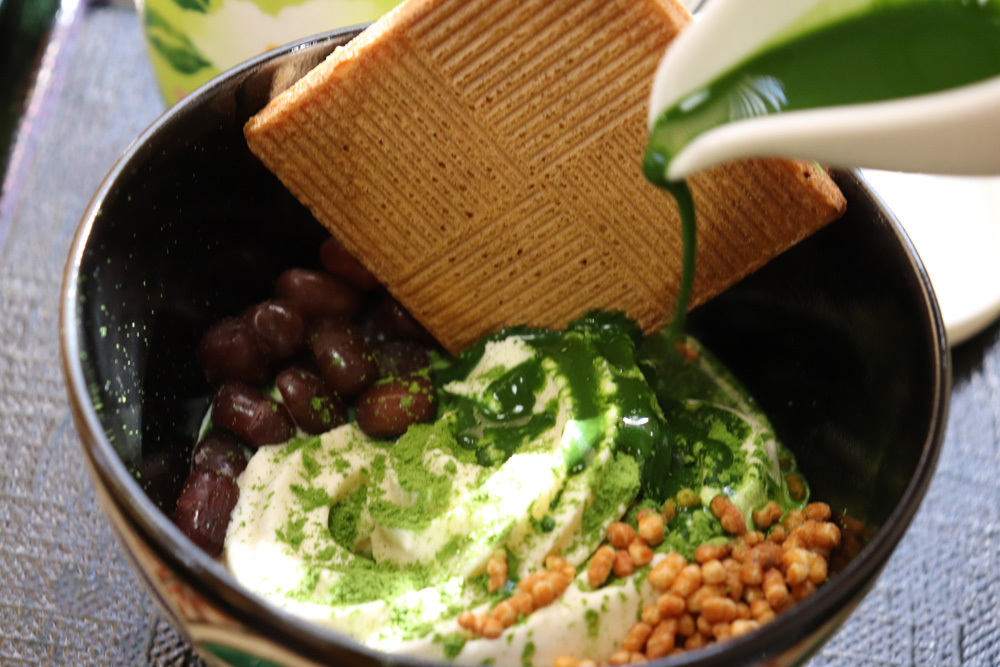
Osadaen, a charming tea café, is operated by Osada Seicha, a long-established tea wholesaler founded in 1948. Known for producing the finest Mori no Ocha (tea from Mori) and Mori no Matcha (matcha from Mori), the café celebrates the rich tea culture of Enshu Morimachi and shares its exceptional products both domestically and internationally.
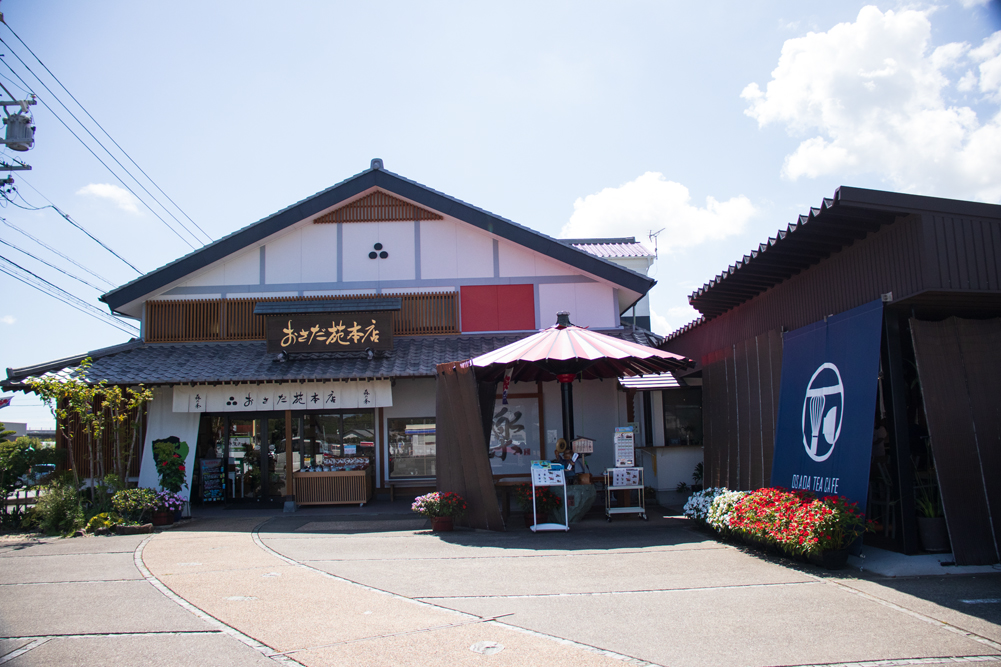
At Osadaen, the signature Mori no Matcha Nono is a testament to freshness and craftsmanship. Tea leaves harvested from the farm’s tea garden are ground daily on a traditional stone mill in the store. The result is a vibrant, eye-catching green tea powder with unparalleled freshness and color.
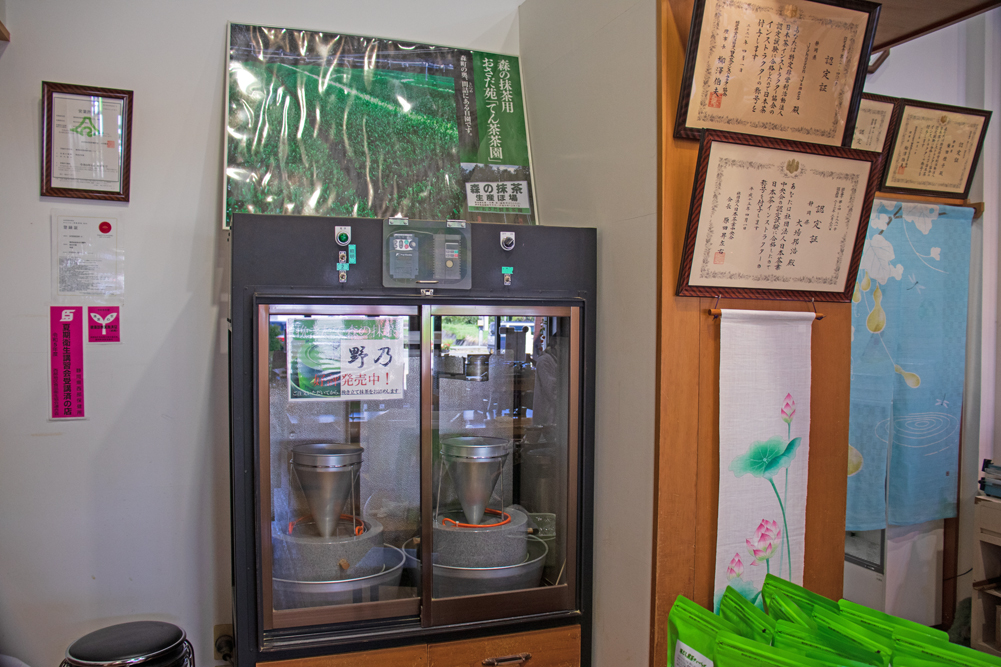
The Nono-Zukushi Sweets Set is a must-try, which features a generous use of Mori no Matcha Nono. The set includes:
● Matcha Affogato: A decadent dessert with rich, velvety matcha sauce.
● Mori no Matcha Cream Sandwiches: Delightful rice crackers filled with luscious matcha cream.
The premium sencha tea bag, Mori no Koibito, accompanies these sweets. Unlike typical hotel or ryokan tea bags, this high-quality tea bag delivers an authentic sencha experience, pairing beautifully with the matcha-infused treats.
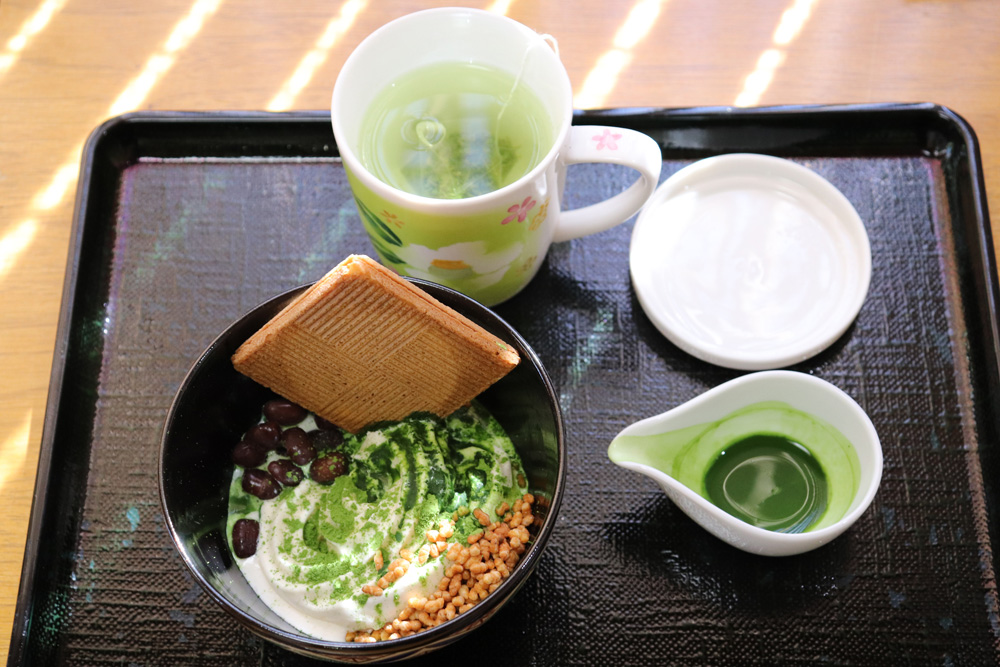
Beyond the sweets set, Osadaen’s menu showcases a variety of creations featuring Mori no Matcha Nono. From drinks to desserts, there’s something for every tea lover.
Additionally, the café doubles as a boutique, offering an array of unique items such as tea-infused sweets, handcrafted pottery, and other tea-related goods.
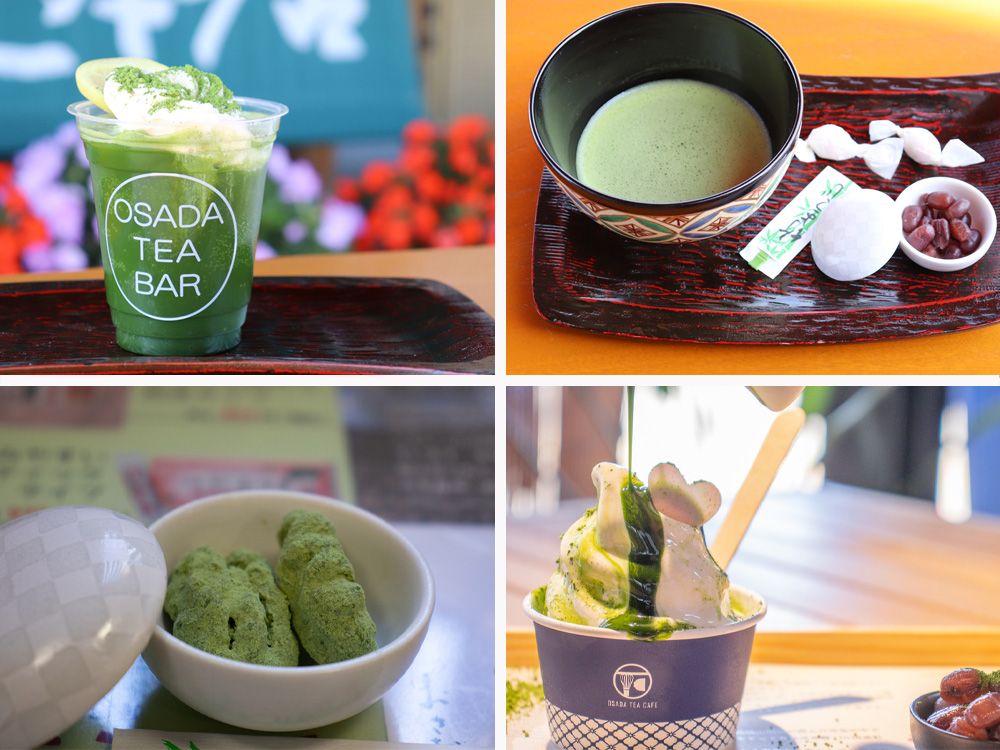
Why not visit Osadaen to savor the true essence of Mori’s matcha and discover one-of-a-kind treasures you can only find here?
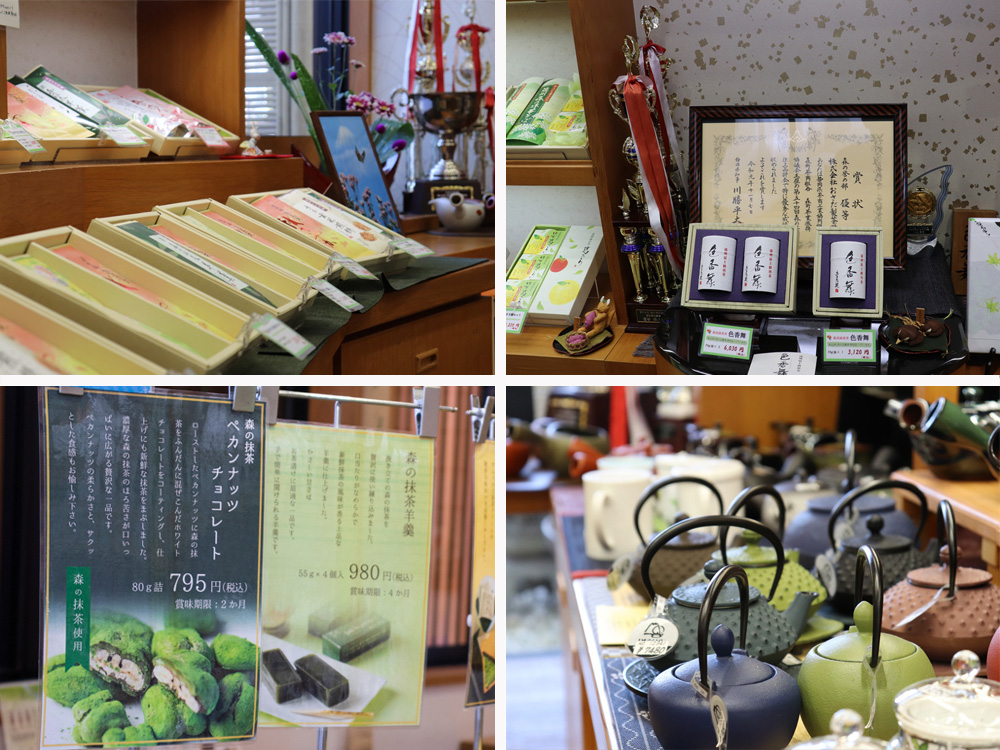
For more information about this shop, click here>>
【Address】1522-1, Mori, Mori-machi, Shuchi-gun, Shizuoka 437-0215, Japan
【Business hours】8:30~18:00
Closed: Open all year round *Closed only on New Year’s Day.
【Web Site】https://www.osadaenhonten.com/
【Access】5 min drive from Shin-Tomei Mori Kakegawa IC.
【Parking】Available.
Tsuyuhikari Parfait【Maruyo Chaya -Uji Matcha- 】
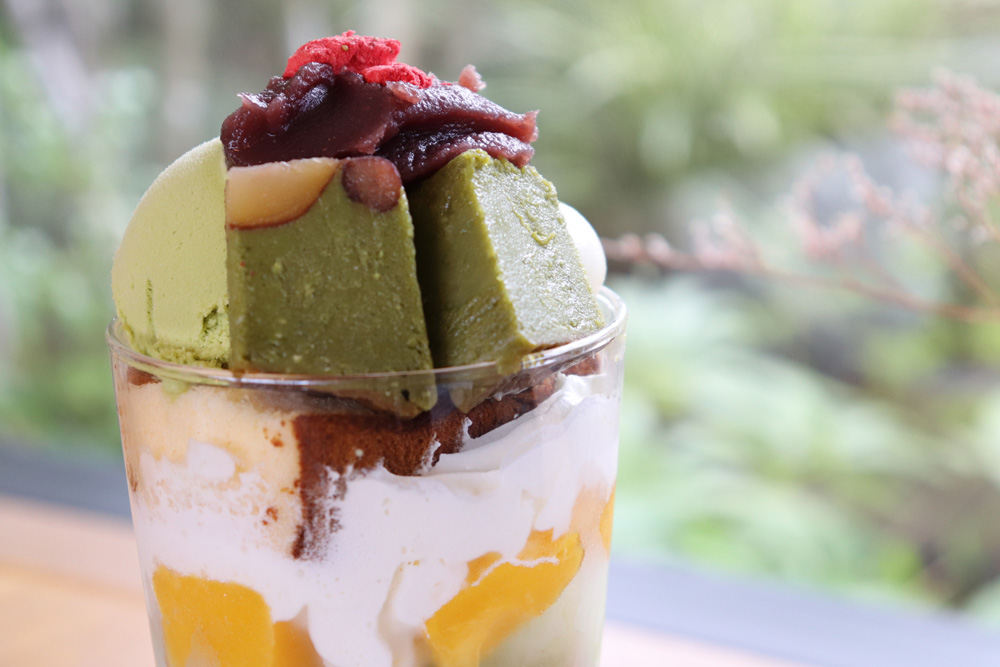
Nestled in Omaezaki City, at the southernmost tip of Shizuoka Prefecture, Maruyo Chaya is a Japanese tea café that offers a delightful menu centered on premium deep-steamed tea. Operated by Akabori Shoten, a tea wholesaler with over 75 years of expertise, the café is a must-visit for tea enthusiasts and dessert lovers alike.
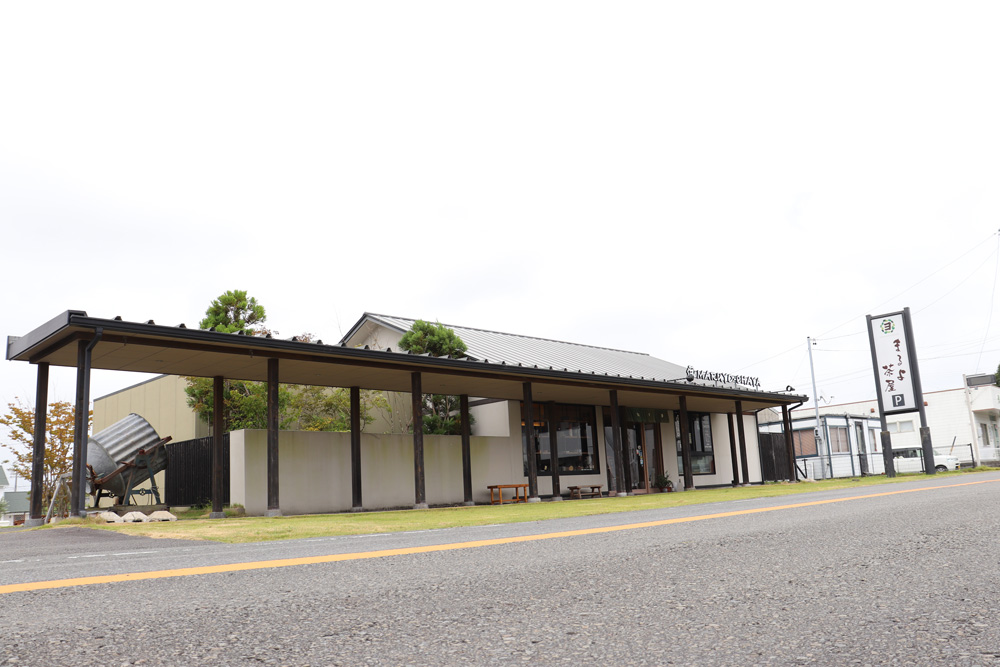
A standout on the menu is the Tsuyuhikari Parfait, a Japanese-style dessert crafted exclusively for Maruyo Chaya. This indulgent treat has been a customer favorite since the café’s opening, thanks to its rich layers of flavor and texture. The parfait features:
● Red bean paste
● Tsuyuhikari terrine chocolate
● Shiratama dango (mochi rice dumplings)
● Fresh cream
● Sponge cake
● Seasonal fruit
● Matcha ice cream
● Granola
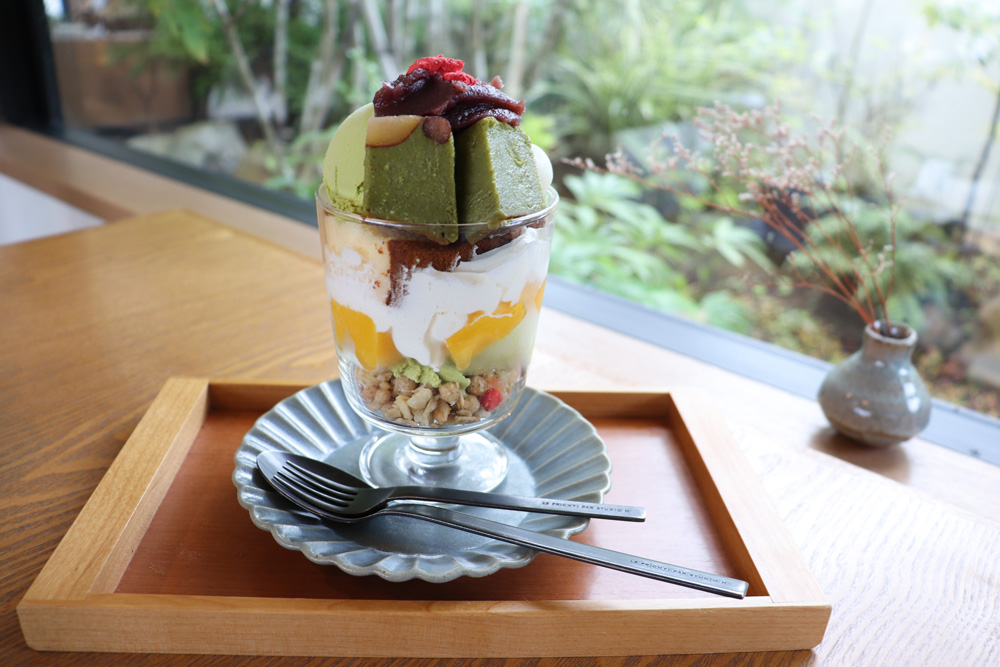
The highlight of this parfait is the Tsuyuhikari terrine chocolate, which crowns the dessert. Its silky smooth texture and the deep, aromatic flavor of Tsuyuhikari tea leave a lasting impression. The delicate tea fragrance unfolds as the chocolate melts in your mouth, creating a truly memorable experience.
The café offers terrine chocolate from an open-case refrigerator, a perfect souvenir or gift. Choose your favorite flavor to enjoy at home or share with loved ones.
In addition to its dessert offerings, Maruyo Chaya serves light meals featuring fresh, locally sourced ingredients from Omaezaki. These dishes complement the café’s tea selection, creating a complete and satisfying dining experience.
Whether you’re here for the ultimate Japanese-style parfait, the exceptional teas, or a taste of Omaezaki’s local flavors, Maruyo Chaya promises a unique and delicious experience. Be sure to stop by and indulge in the perfect harmony of tea and dessert.

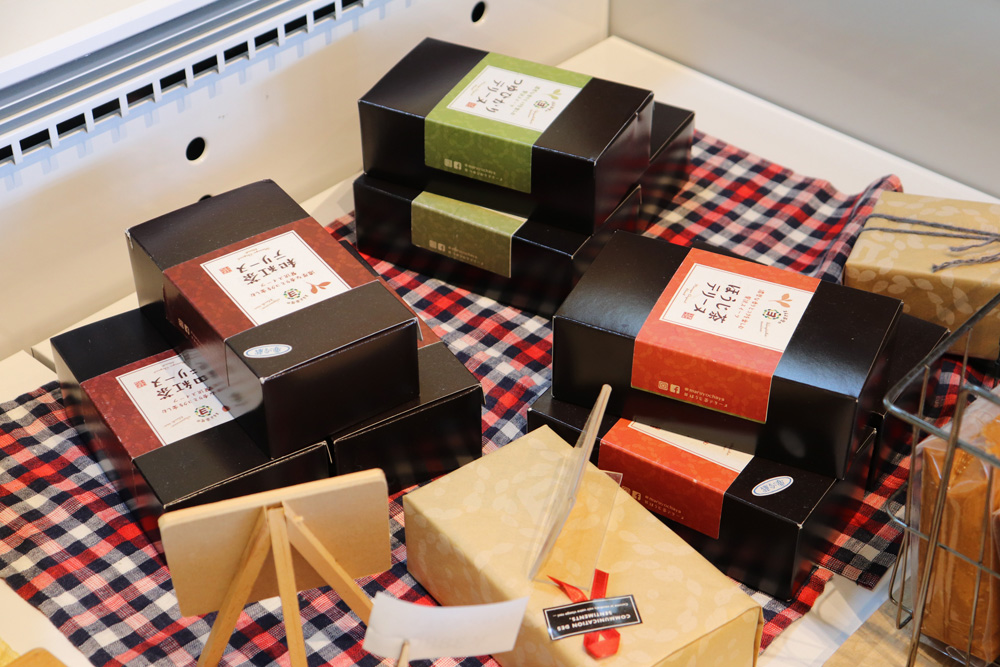
For more information about this shop, click here>>
【Address】1950-2, Kadoya, Omaezaki-shi, Shizuoka 437-1615
【Business hours】Cafe/Tea-service 10:00~17:00
(Last order is 16:30.)
Closed: Wednesdays (Open on the 4th, 14th, 24th and public holidays)
【Web Site】https://maruyo-chaya.com/
【Access】Take the Shizutetsu Bus bound for Omaezaki on the Osaka Line from the north exit of JR Kakegawa Station, and get off at Kamaike bus stop.
【Parking】Available.
Tea Affogato【MARUZEN Tea Roastery -Shizuoka Matcha-】
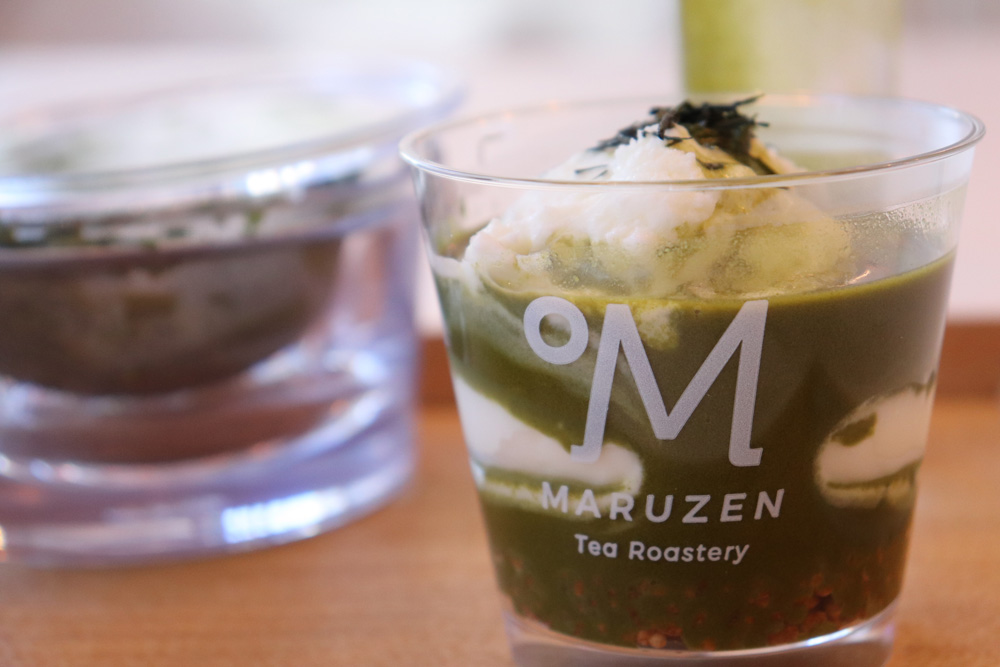
Located on the charming Gofukucho-dori, MARUZEN Tea Roastery is a stylish tea café featuring a minimalist white interior that exudes modern elegance. Known for its innovative approach to tea, the café invites guests to explore how roasting temperatures influence the aroma and flavor of tea through exquisite drinks and tea gelato offerings.
Roasting temperature plays a vital role in shaping a tea’s character. Tea retains a fresh, light flavor at lower temperatures, while higher temperatures draw out a robust, aromatic profile. This nuanced transformation is central to the MARUZEN experience, where every sip tells a story of craftsmanship and precision.
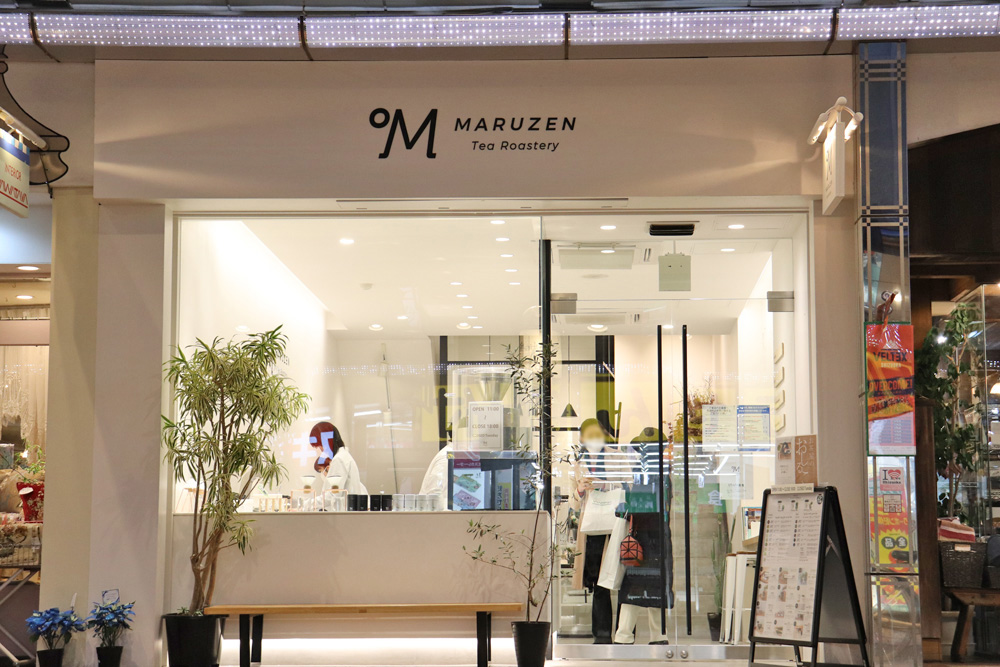
One of the café’s standout offerings is the Tea Affogato (Drink Set). This delightful dessert pairs velvety white cream gelato with a rich, aromatic tea sauce. The magical moment when the warm tea sauce is poured over the chilled gelato completes an irresistible contrast of textures and flavors.
Guests can choose from three types of tea sauce, each offering a unique taste experience:
● Sencha: Light and refreshing with subtle grassy notes.
● Genmaicha: Nutty and toasty, with a comforting aroma.
● Hojicha: Deeply roasted with a bold, smoky flavor.
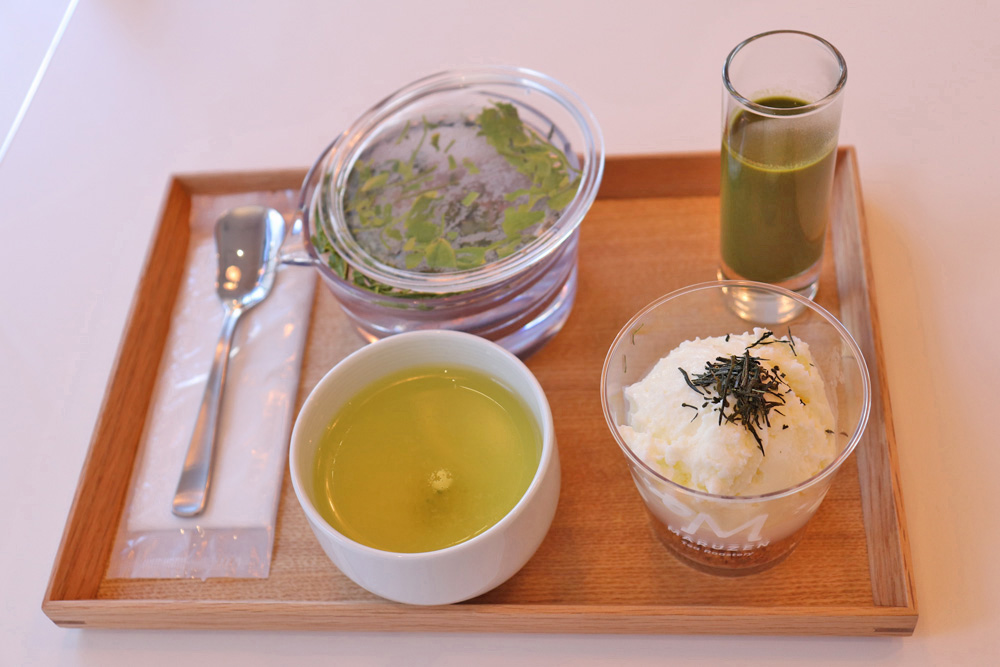
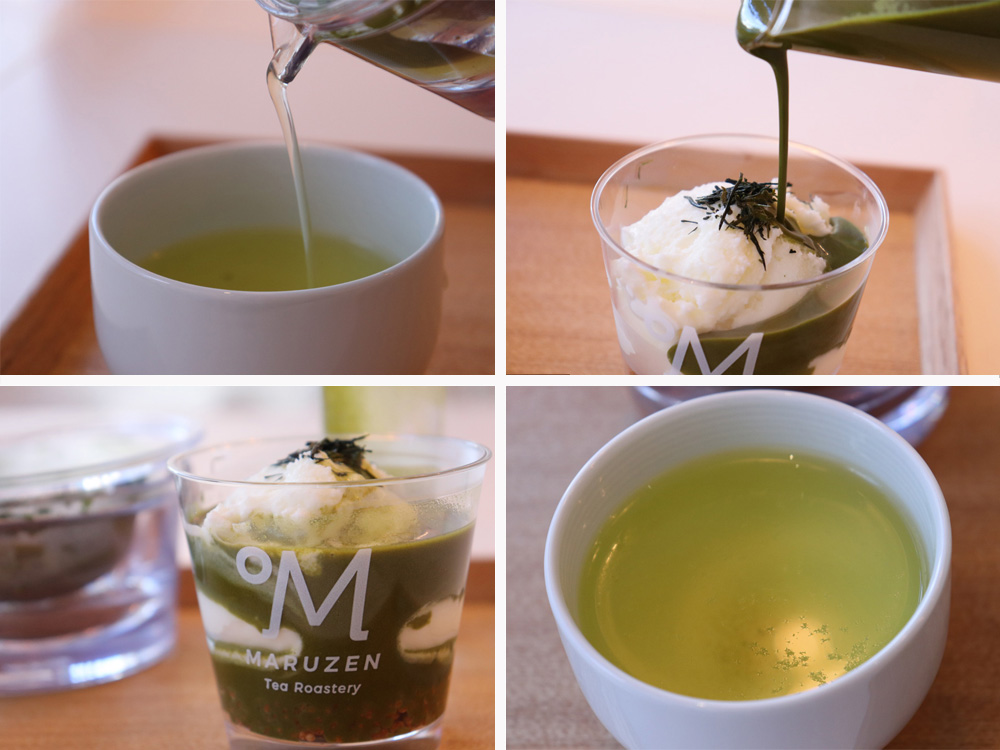
At MARUZEN Tea Roastery, every dish and drink is an opportunity to delve into the intricate world of tea. From the interplay of roasting temperatures to the harmony of flavors in each dessert, the café provides a sensory experience that deepens your appreciation for tea’s artistry.
Experience the remarkable flavor gradations of tea and discover the perfect cup tailored to your preferences.
For more information about this shop, click here>>
【Address】 2-2-5 Gofukumachi, Aoi-ku, Shizuoka City, Shizuoka Prefecture, 420-0031, Japan
【Business hours】Opening hours: 11:00AM – 18:00PM
Closed: Tuesdays
【Web Site】http://www.maruzentearoastery.com/
【Access】8 minutes walk from JR Shizuoka Station.
【Parking】No parking (Pay parking available nearby).
Must-See for Matcha Lovers! Unique Feature on Top Matcha Sweets to Enjoy in Shizuoka, Japan’s Famous Tea Region – summary –
In this article, we introduced some of Shizuoka’s finest matcha sweets shops. Whether you’re a dedicated matcha enthusiast or simply have a sweet tooth, these destinations offer a chance to experience the unique charm of Shizuoka’s matcha.
Shizuoka Prefecture is home to many more tea cafes where you can savor exceptional matcha sweets. We look forward to continuing to share the allure of these hidden gems in the future. We invite you to visit Shizuoka, a renowned tea-producing region, and indulge in the rich flavors of authentic matcha.
Recommended articles : Discover the Best Matcha Sweets at Japanese Convenience Store!
| Writer | Norikazu Iwamoto |
| Career | Ochatimes chief editer. Meeting with Vice Governor of Shizuoka prefecture. Judge of Shizuoka 100 tea’s award in 2021~23. Ocha Times link introduced at website of World O-CHA(Tea) Festival 2022, Tea Science Center, The City of Green Tea Shizuoka, Ministry of Agriculture, Forestry and Fisheries. |


 Go to Japanese page
Go to Japanese page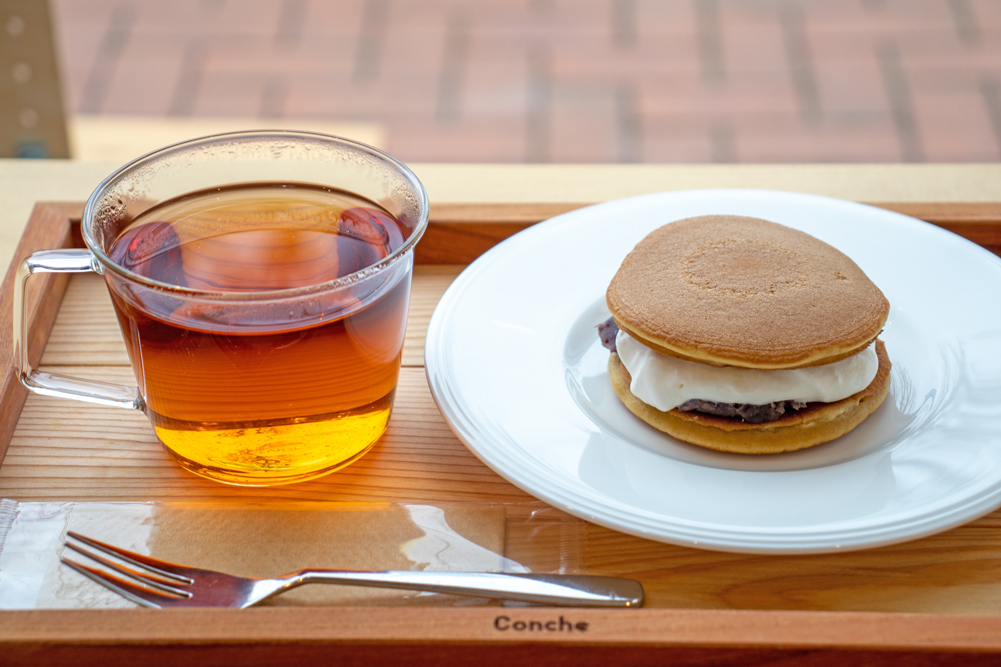
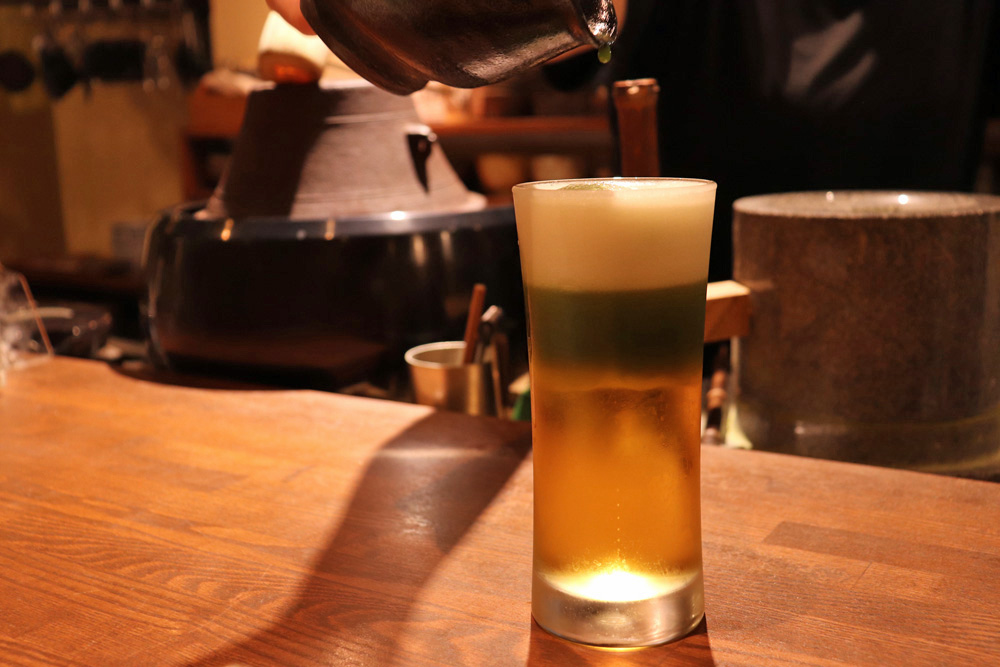
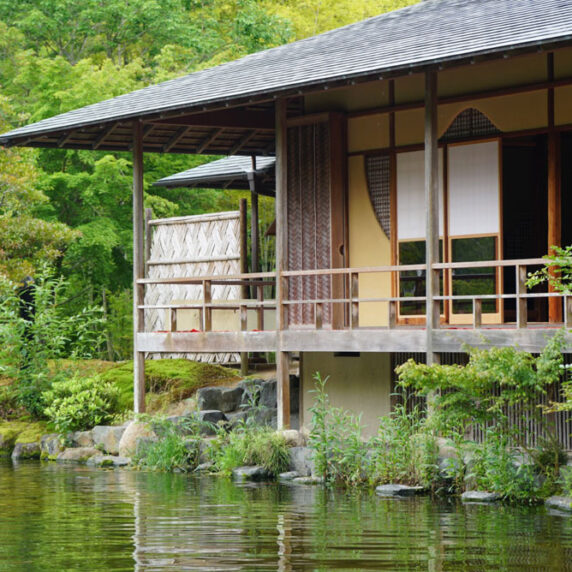
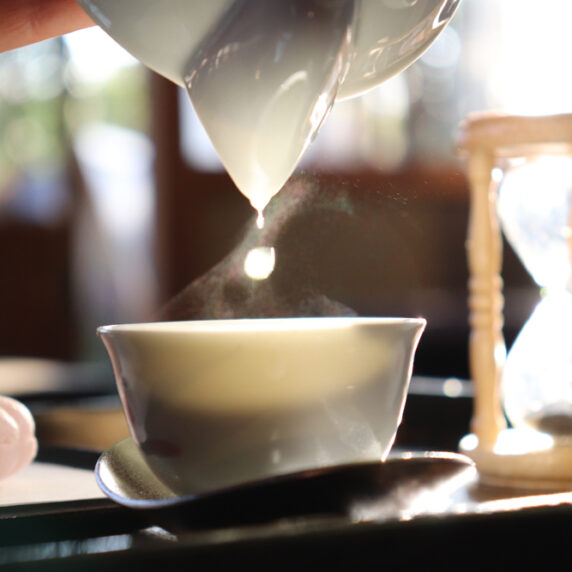
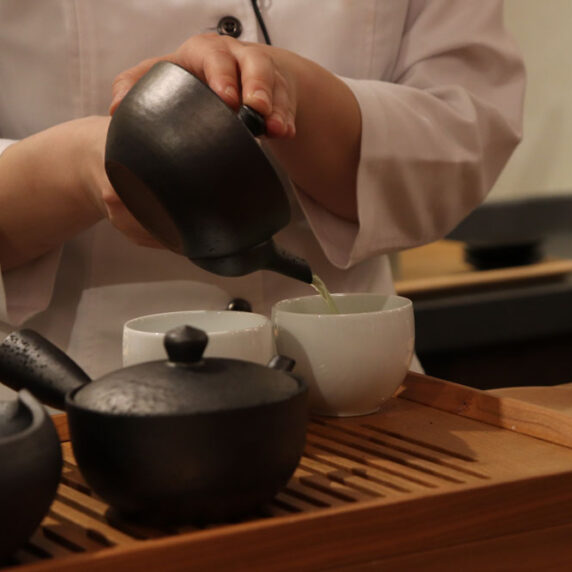
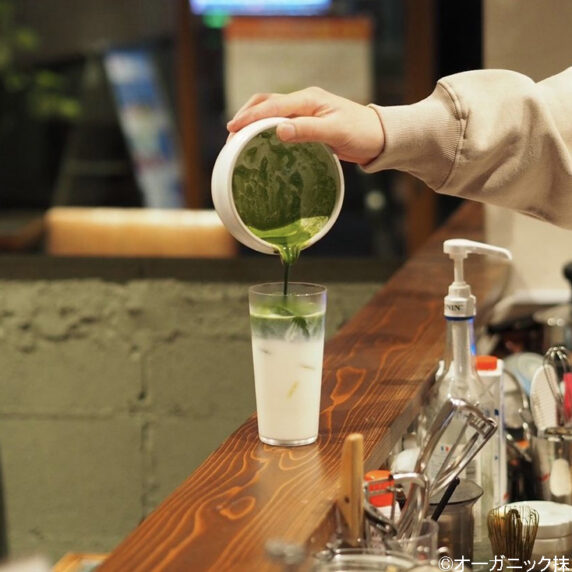




 on the red bar to close the slide.
on the red bar to close the slide. to see the distance between the current location to the Chaya.
to see the distance between the current location to the Chaya.